- COPD
- Gender Affirming Care
- Motivational Interviewing
- Cultural Competence
- Harm Reduction
- Substance Use Disorder
- Diabetes Management
- Heart Failure
- Trauma-informed care
Video library
Our webinars provide practical tools to address a wide range of clinical care issues. Expand each section to read the session overview and watch the video recording. The most recent webinars appear at the top of the list.
Key Session Takeaways
(click the link to view a clip):
Part 1
- The difference between jail and prison – 1:18
- Map of DOC locations across Oregon – 2:27
- Intake process – 4:25
- Ongoing mental health care – 7:19
- Levels of care – 14:55
- Mental health codes – 17:24
- Level of functioning – 18:40
- Behavioral health levels of care – 21:36
- Substance use disorder treatment selection and placement – 22:50
- Co-occurring disorders treatment – 26:08
- Chronic disease model for SUD treatment – 27:29
- Admin team contact information – 29:00
Part 2
- About the DOC Release Planning Team – 0:25
- Release planning timeline – 4:30
- Reentry benefits – 11:56
- Reentry classes – 20:41
- One-on-one services – 34:15
- Work Source Reentry program and Inside Out network – 36:13
- Release planning team contact information – 41:11
- Beginning of Q&A – 41:43
- Volume of people working with Reentry team – 42:04
- How reentry works with specialty populations, such as those with complex medical needs and those who are aging and older – 43:04
- Individuals releasing to homelessness - 45:11
- Considerations for those who have been incarcerated 15+ years - 47:09
- Care coordination with primary care, behavioral health, and health plan - 51:37
- Medications at time of release – 57:15
- Medications for substance use disorders – 58:55
- Utilization of therapy and crisis services during incarceration - 1:02:42
Key Session Takeaways
(click the link to view a clip):
- MOUD and mortality reduction: Part 1 - 5:20
- Barriers to MOUD: Part 1 – 6:57
- Buprenorphine basics: Part 1 – 9:49
- Myth #1 – One can’t achieve pain control while on buprenorphine. Fact – It is possible to achieve pain control with buprenorphine! Part 1 – 11:48
- Fentanyl in the drug supply: Part 1 – 13:05
- Overview of buprenorphine transition options: Part 1 – 13:52
- Standard dosing option: Part 1 – 16:40
- Low dosing option: Part 1 – 18:08
- High dosing option: Part 1 – 19:22
- Standard dose initiation: Part 1 – 20:07
- Low dose initiation: Part 1 – 21:18
- Example patient dosing table: Part 1 – 25:41
- High dose initiation: Part 1 – 26:34
- CA Bridge Buprenorphine Self-Start Guide: Part 1 – 27:24
- Low-to-high dose initiation: Part 1 – 28:17
- Adjunct medications for opioid withdrawal: Part 1 – 30:10
- Long term dosing: Part 1 – 32:50
- Myth #2 – The maximum dose of buprenorphine is 24mg. Fact – One can use up to 32mg of buprenorphine, when appropriate: Part 1 - 33:02
- Buprenorphine administration technique: Part 1 - 34:36
- Myth #3 - Patients who use multiple substances should not use buprenorphine. Fact- Patients who use multiple substances are often able to use buprenorphine– Part 1 37:45
- Benzodiazepines and buprenorphine: Part 1 – 39:15
- Co-occurring mental health disorders: Part 1 – 45:02
- Buprenorphine and stimulants: Part 1 – 50:37
- Buprenorphine and cannabis: Part 1 – 53:39
- General approach for those using multiple substances: Part 1 – 56:20
- Pros and cons of injectable ER buprenorphine: Part 2 – 0:10
- Injectable ER buprenorphine options: Part 2 – 2:52
- Sublocade pharmacokinetics: Part 2 – 3:43
- Sublocade serum levels: Part 2 – 5:48
- Sublocade starts: Part 2 – 7:30
- Sublocade updates: Part 2 – 9:52
- Sublocade missed doses: Part 2 – 13:42
- Brixadi pharmacokinetics: Part 2 – 14:56
- Brixadi serum levels: Part 2 – 17:17
- Brixadi starts/dose titration: Part 2 – 18:52
- Brixadi dosing: Part 2 – 20:26
- Serum levels of Brixadi – daily, weekly, monthly: Part 2 - 23:04
- Switching between products: Part 2 – 27:23
- Things to consider when choosing formulation: Part 2 – 29:24
- Injectable to taper off sublingual: Part 2 – 31:16
- Steps to obtaining in clinic: Part 2 – 32:57
- Naloxone: Part 2 – 36:23
- Audience question: Are there any medications for methamphetamine use disorder? Part 2 – 38:32
- Audience question: Contingency management overview: Part 2 – 42:22
- Audience question: Is it common to need to give multiple Narcan/naloxone doses in an overdose event?: Part 2 – 44:54
- Audience question: Use of bupropion in patients with severe congestive heart failure related to methamphetamine?: Part 2 – 44:47
- Audience question: If naloxone is expired, is it still safe to administer?: Part 2 – 49:28
Key Session Takeaways
(click the link to view a clip):
- Introduction to the session
- Dr. Leona Okeefe on why doulas matter for Primary Care
- Data Analyst findings: causal effects of doula supports among Medicaid members
- Summary of outcomes: reduced C-section rates, increased post partum depression screenings, increased post partum BH engagement.
- The role of medical providers in raising awareness about doulas
- Dr. Cheney on value of increased doula utilization; the role of CCOs and Health Plans
- Maternal mortality rates , disparities, and peer country comparisons
- State and Federal legislation resulting in expanded access to doula care
- Higher impact when culturally and linguistically matched with patient
- The science behind decreased fear and anxiety, lowered need for pain meds and increased rates of vaginal delivery.
- Oregon was the first to create a billable pathway using Medicaid dollars!
- Barriers and Challenges to Navigating Medicaid reimbursement
- (Part 1) 2018 program started to connect birthing mothers with culturally and linguistically matched doulas
- (Part 2 ) Community Doula Program offerings and outcomes
- Importance of Doula Hub model (Doula Hub Part 1)
- Doula training, mentorship, credentialling and supervision (Doula Hub Part 2)
- Training to prevent “doula discord” (Doula Hub Part 3)
- Doula reimbursement (Doula Hub Part 4)
- Role of medical providers to promote doulas
- Doula Outcomes: Language interpretation
- Doula Outcomes: Breast Feeding and Lactation Support
- Doula Outcomes: Lower preterm labor and C-section rates
- Hospital approach to doulas impact doula outcomes
- Cost effectiveness of Doulas
- Doulas reduce avoidable ED use
- Prevention of post partum maternal mortality due to doulas
- Person-centered care vs facility-centered care
- Doulas motivated by lived experience
- Community Doula Program
- Closing reflections
- Q&A: Doula reimbursement challenge
- Q&A: Doula utilization metric?
- Q&A: Why get a doula involved?
- Q&A: Are we at risk of losing doulas a covered benefit?
- Call to Action!
- THW Liaison as a connection to doulas in your region
- Closing statement
This session of CareOregon Pharmacy’s MEDS Ed program focuses on what we know about stigma and how it impacts people who use substances, most specifically within health care.
Key Session Takeaways
(click the link to view a clip):
- Training context: the opioid overdose epidemic: Part 1 – 12:06
- Meeting patient needs: Part 1 – 18:13
- Client experience around tapers: Part 1 – 36:17
- How stigma delays access to care: Part 1 – 53:05
- Trauma-Informed Care 101: Part 2 – 1:01:44
- The evidence for Trauma-Informed Care: Part 2 – 1:13:59
- The Trauma-Informed Difficult Conversations Road Map: Part 3 – 1:26:18
- The Most Important Takeaway: Focus on Care and Safety: Part 3 – 1:48:06
- When hard feelings without reacting to them: Part 3 – 1:59:34
- Q&A: Part 4 – 2:13:36
This session of CareOregon Pharmacy’s MEDS Ed program focuses on what we know about stigma and how it impacts people who use substances, most specifically within health care.
Key Session Takeaways
(click the link to view a clip):
- Discussing positive media depictions of characters involving SUD: Part 1 – 15:05
- Medical evidence – stigmatization as a predictor of dependence: Part 1 – 27:18
- Stigma towards bereavement – blaming the deceased: Part 1 – 36:36
- When stigma and isolation encourages further drug taking: Part 1 – 40:07
- How people change their behavior to avoid stigma in healthcare setting: Part 1 – 45:18
- Narratives we might carry, regardless of evidence – true or false: Part 1 – 49:00
- Discussing positive media depictions of BIPOC characters involving recovery: Part 1 – 57:50
- Structural and interpersonal barriers to access care among African Americans: Part 1 – 1:03:50
- The layers of the types of stigma – structural, interpersonal, self-stigma: Part 2 – 00:00
- Recap of the layers of stigma: Part 2 – 19:16
- Actionable steps around language: Part 2 – 20:11
- Medical language to use and avoid: Part 2 – 28:48
- Notes on language to help make effective change – connect, don’t correct: Part 2 – 32:20
- Actionable skill-building – Elicit, Provide, Elicit: Part 2 – 34:32
- Q&A: Part 3
This session of CareOregon Pharmacy’s MEDS Ed program helps explain why integrating oral health care referrals into your practice’s workflow is just as crucial as integrating SUD and behavioral health.
Key Session Takeaways
(click the link to view a clip):
- Why oral health integration matters: Part 1 – 2:20
- Outcomes: oral health care impact can contribute just as much to A1C reduction as prescribed medications: Part 1 – 7:24
- Common oral health concerns during pregnancy: Part 2 – 7:49
- Understanding Project Nurture: Part 3 – 5:33
- Oral Health Integration tips: Part 3 – 21:07
- Supporting Dental Care in Pregnant People with SUD: Part 3 – 25:53
- Pediatric Oral Health Integrations and Concerns: Part 4 – 2:22
- Current state and Caries Risk Assessment: Part 5 – 3:46
- Dental Referrals – Ease of Navigation: Part 5 – 15:29
- Myth busting: Part 5 – 23:33
- OHP Dental Benefits Navigation and Q&A: Part 6 – 11:00
This session of CareOregon Pharmacy’s MEDS Ed program focuses on what we know about stigma and how it impacts people who use substances, most specifically within health care.
Key Session Takeaways
(click the link to view a clip):
- Substance Use trends – including Oregon-specific; overdose data: Part 1 – 9:00
- Youth fentanyl deaths growing 4x faster than U.S. as a whole, increased by 550%: Part 1 – 13:47
- The risk of developing a substance use disorders is greater for those who initiate use in adolescence: Part 1 – 16:16
- What’s different about the teen brain: Part 1 – 18:27
- Optimistic bias – adolescent belief of invincibility – identity vs. role confusion: Part 1 – 21:28
- Neurobiology and Risk Factors: Part 1 – 24:24
- Screening Tools: Part 1 – 34:32
- Guidance on the importance of Integration: Part 1 – 40:08
- Developmental Considerations for Adolescents and Their Relationship to Substance Use: Part 2 – 7:06
- What doesn’t work: Part 2 – 12:20
- What does work: Part 2 – 13:44
- The importance of Motivational Interviewing: Part 2 – 16:14
- Adverse Childhood Experiences and Positive Childhood Experience interventions: Part 2 – 23:53
- Recovery Oriented Systems of Care: Part 2 – 30:00
- Goals of School Based Health Centers and their services - locations: Part 3 – 4:37
- How School Based Health differs from the School Nurse: Part 3 – 10:18
- Eligibility criteria: Part 3 – 11:46
- Screening and Education: Part 3 – 12:38
- Dispensing: Part 3 – 27:53
- Urgent overdose prevention takeaways: Part 3 – 35:15
- Q&A: Part 4
This session of CareOregon Pharmacy’s MEDS Ed program focuses on the challenges of maintaining access to health care faced by people released from jail correctional facilities.
Key Session Takeaways
(click the link to view a clip):
- Differences between jail and prison, including average length of stay: Part 1 – 4:46
- Things that impact transitions: Part 1 – 8:44
- Types of care services available in custody: Part 1 – 13:46
- How language makes a difference: Part 1 – 16:23
- Dealing with COVID: Part 1 – 22:51
- Social Determinants of Health and transition services: Part 1 – 30:22
- Nurse perspective – the rewards of seeing people do better: Part 2 – 00:51
- Length of stay and Measure 11 crimes: Part 2 – 5:15
- Mental Health Care, Crisis Management, Right to Refuse: Part 2 – 18:24
- Substance Use & Withdrawal Management: Part 2 – 23:42
- Release Planning: Part 2 – 25:57
- Jail to community transitions: Part 3 – 3:04
- Stigma during transitions: Part 3 – 8:03
- Peer support: Part 3 – 19:08
- Peer perspective: Part 4 – 12:10
- Panel Q&A segment: Part 5 – 00:29
This session of CareOregon Pharmacy’s MEDS Ed program focuses on basic, practical methods to promote better blood pressure control and chronic kidney disease management, co-morbidities.
Key Session Takeaways
(click the link to view a clip):
- Cardiovascular mortality risk doubles with each 20/10 mmHg increase in blood pressure: Part 1 – 7:35
- Initial drug therapy guidance: Part 1 – 22:38
- Avoid combining NSAIDs with ACEi/ARBs due to resulting significant decrease in glomerular perfusion/GFR: Part 1 – 40:26
- A patient with CKD is 100x more likely to die than ever reach ESRD – usually of cardiovascular disease: Part 1 – 44:13
- Resistant hypertension (12-15% of all patients with hypertension) further increases the risk of developing CAD, heart failure, stroke and all cause mortality: Part 2 – 6:55
- Continue to encourage lifestyle modification even as hypertension is being medically managed; weight reduction provides the largest SBP reduction rate: Part 2 – 15:45
- Optimize 3 drug regimen when treating resistant hypertension – RAS blocker (ACEi/ARB), CCB, and diuretic appropriate for kidney function (thiazide GFR > 30 – use chlorthalidone, and loops diuretic GFR <30): Part 2 – 18:12
- Don’t forget about spironolactone!: Part 2 – 22:00
- Perspective on avoiding Atenolol and Metoprolol: Part 3 – 3:37
This session focuses on the impactful work and learnings of the Zero Overdose initiative, a vision of ending overdose deaths in our area.
Key Session Takeaways
(click the link to view a clip):
- Understanding supportive housing: Part 1 – 11:54
- Overdose risk increases in isolated settings: Part 1 – 25:02
- Improving care coordination: Part 1 – 35:34
- Implementation of the Zero Overdose initiative: Part 2 – 45:25
- What’s been done – Overdose prevention and aftercare: Part 2 – 1:00:34
- Initial data and outcomes: Part 2 – 1:17:40
- Success stories: Part 2 – 1:24:30
- Recommendations: Part 2 – 1:35:23
- Q&A Discussion: Part 3 – 1:42:42
A revealing look at how clinical expertise gets in the way of being understood, and the importance of being able to communicate simply.
Key Session Takeaways
(click the link to view a clip):
- Being able to read complex instructions doesn’t mean you have understood them: Part 1 – 22:17
- A devastating example of the consequences of assumed understanding: Part 1
- The importance of universal precautions: Part 1 – 35:44
- Clear Communication Best Practices & avoiding jargon: Part 1 – 40:32
- Average citizens express their medical understanding: Part 1
- Examples of white boards and medication labels causing confusion: Part 1 – 46:03
- More Communication Best Practices: Part 1 – 50:36
- Examples of Numeracy: Part 1 – 57:11
- Medication Directions and Simplification: Part 2 – 1:01
- Be as explicit as possible: Part 2 – 5:12
- Using Universal Medication Schedule (UMS) directions: Part 2 – 9:25
- Strategies to improve non-adherence: Part 2 – 13:22
- Electronic Health Record (EHR) issues and examples: Part 2 – 16:50
- Q&A Discussion: Part 3
This session of CareOregon Pharmacy’s MEDS Ed program focuses on the range of new medications and treatments available to help heart failure patients whose lives are at risk.
Key Session Takeaways
(click the link to view a clip):
- The paradigm shift in medical therapy options: Part 1 – 18:03
- The crucial importance of optimal doses – the highest dose possible: Part 1 – 21:21
- Clinical pearls for Entresto: Part 1 – 25:09
- We are not treating our patients with the appropriate doses and medications: Part 1 – 35:35
- “I’m a huge fan of Natriuretic Peptides:” Part 1 – 49:17
- How do you know when a patient is advancing into heart failure? Part 1 – 57:27
- Why these drugs act differently, and why we use them the way we do: Part 2 – 4:28
- Nuances and pearls for beta blockers: Part 2 – 14:40
- Methamphetamine use and cardiomyopathy: Part 2 – 27:57
- Barriers to adherence – facilitators of adherence: Part 2 – 36:44
- Recuperative Care Program (RCP) heart failure program and provider interventions: Part 2 – 43:55
- Barriers to access – prescription, pharmacy, and coverage-related issues: Part 3 – 2:12
- Prior authorization issues and goals: Part 3 – 9:00
- Navigating the formulary: Part 3 – 9:43
- Prior Authorization: Streamlining tips and standard requirements: Part 3 – 13:07
This session of CareOregon Pharmacy’s MEDS Ed program focuses on why an understanding of substance use disorder is integral to hospice, palliative care, and all physical health practices.
Key Session Takeaways
(click the link to view a clip):
- Overcoming the “hidden curriculum” of SUD stigma: Part 1 – 9:06
- Reviewing the racism-tinged history of substance use disorder criminalization as we move towards a more evidence-based, compassionate approach: Part 1 – 30:50
- Building blocks to support more compassionate and open-hearted care for patients at any stage of their disease process: Part 1 – 40:15
- Moving towards ethical, integrated care: Part 2 – 21:40
- Considerations and resources to get us there: Part 2 – 24:50
- Newly established palliative care benefit requirements: Part 3 – 7:38
- Screening, next steps, and approach to care: Part 3 – 10:24
This session of CareOregon Pharmacy’s MEDS Ed program provides an enlightening fresh perspective on navigating pharmacy benefits.
Key Session Takeaways
(click the link to view a clip):
- Mortality rates have increased a lot from fentanyl's arrival in the drug supply in 2019: Part 1 – 11:11
- Folks will likely start injecting again soon: Part 1 – 18:50
- The emergence of Xylazine: Part 1 – 20:55
- Responding to fentanyl requires adapting to its unique properties: Part 1 – 23:50
- There is no “one-size-fits-all” approach to fentanyl>buprenorphine transitions: Part 2 – 23:55
- Know your patient before choosing an induction strategy: (assess use pattern, social situation, medical comorbidities): Part 2 – 24:08
- Schedule adjunctive comfort medications: Part 2 – 34:43
- Optimize non-pharmaceutical supports (including a whole lotta LOVE): Part 2 – 44:04
- High Tolerance Methadone Induction: Part 3 – 13:57
- Buprenorphine Administration in the hospital: Part 3 – 23:06
- Pregnancy and postpartum OD: Part 3 – 34:33
This session of CareOregon Pharmacy’s MEDS Ed program provides an enlightening fresh perspective on navigating pharmacy benefits.
Key Session Takeaways
(click the link to view a clip):
- Benefits Overview – formulary, costs, and myths: Part 1 – 4:55
- The PA Process – pros and cons, tips, and what’s coming: Part 2 – 00:00
- Turnaround Times: Part 2 – 18:52
- Medicaid-Specific Benefits – DMAP, Prioritized Guidelines, Pain Points: Part 2 – 22:50
- Medical Benefits – Intro: Part 3 – 1:00
- DME specific supports: Part 3 – 6:35
- Diabetic supplies & common problems: Part 3 – 8:23
- Continuous Glucose Monitoring: Part 3 – 21:10
- Wound Care Supplies: Part 3 – 24:56
- Wheelchairs: Part 3 – 27:20
- CareOregon Advantage Plus (Medicare) – what’s covered: Part 4 – 00:52
- Part D Formulary Rules & Exclusions: Part 4 – 6:57
- Care Card and Extra Benefits: Part 4 – 21:10
In this session of CareOregon Pharmacy’s MEDS Ed program, we continue our exploration of inequities in health care in a session focusing on culturally-specific medication challenges.
Click here to view the whole sessionKey Session Takeaways
(click the link to view a clip):
- State of the situation: Part 1 – 3:55
- Overview of quality of care disparities: Part 1 – 7:11
- Disparities in medication use – medication equity challenges: Part 1 – 13:17
- North by Northeast’s Mission: Part 2 – 1:43
- Medication considerations: Part 2 – 8:17
- Solutions & pearls – things that have worked: Part 2 – 14:28
- Health policies: Part 3 – 1:37
- Prescribing: Part 3 – 5:25
- Dispensing: Part 3 – 13:00
- Administration: Do’s & Don’ts – solutions: Part 3 – 17:48
- Panel Discussion: Part 4 – 00:00
This session of CareOregon Pharmacy’s MEDS Ed program explores the importance of prescribing consistency for Behavioral Health and Substance Use Disorder medications during pregnancy.
Click here to view the whole sessionKey Session Takeaways
(click the link to view a clip):
- Substance Use Disorder changes the way people think: Part 1 – 5:23
- SUD and gender differences: Part 1 – 19:02
- Medications for OUD Used in Pregnancy: Part 1 – 30:23
- Opioid Withdrawal – Neonatal Abstinence (NAS) and Withdrawal (NOWS) syndromes: Part 1 – 49:15
- Alcohol Use Disorders in pregnancy: Part 1 – 53:00
- Key Takeaway Review: Part 1 – 58:55
- Sudden Stops are risky: Part 2 – 1:45
- Planning and Categories: Part 2 – 6:42
- Medication and breastmilk – risk vs. benefits: Part 2 – 15:06
- Medication dosages and timing: Part 2 – 18:50
- Substance Use: Part 2 – 24:25
- Depression, anxiety, bipolar disorder: Part 2 – 27:44
- Deprescribing: Part 2 – 44:40
- Panelists Q&A Segment: Part 3 – 00:00
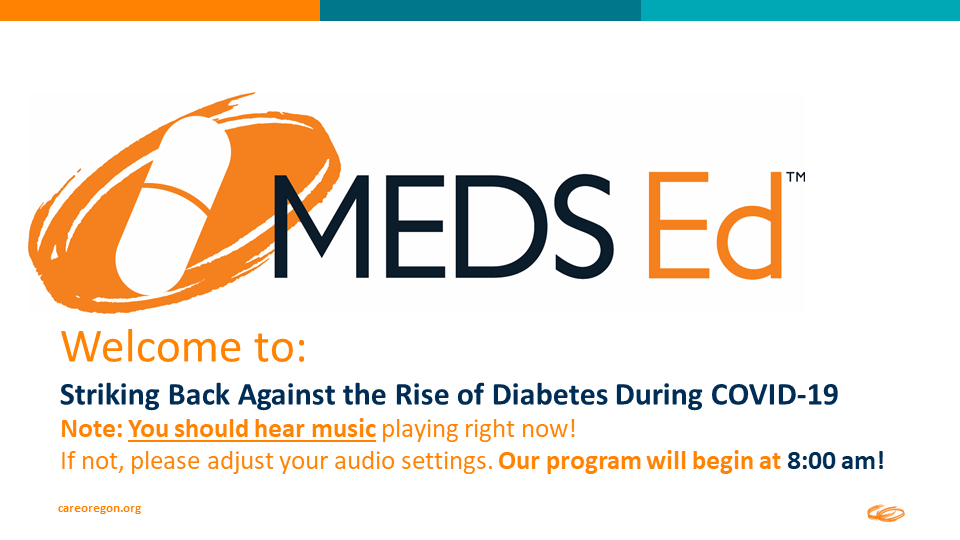
This session of CareOregon Pharmacy’s MEDS Ed program highlights the treatment of diabetes during the COVID-19 era and updates on medication management from both a diabetologist's and pharmacist's perspective.
Click here to view the whole session
Key Session Takeaways
(click the link to view a clip):
- Covid-19 has caused a significant decrease in diabetes maintenance and led to worse glycemic control for many. Part 1 – 11:25
- Encouraging patients to come back into clinic by allaying fears, improving use of and access to technological solutions (telehealth), and transitioning care to the community setting is critical for patients with chronic disease. Part 1 – 17:40
- Dental care is one of the most delayed services during the pandemic and critical for patients with diabetes in order to improve glycemic control. Part 1 – 22:50
- CareOregon has enhanced its Diabetes Treatment Pathway to improve and simplify patient treatment. Part 2 – 1:19
- Utilizing DPP-4s effectively early in the disease process. Part 2 – 12:24
- Newer SGLT-2 Inhibitors that are effective and beneficial. Part 2 – 15:19
- When to consider starting Basal Insulin. Part 2 – 19:30
- What to do when Insulin Resistance is an issue. Part 2 – 27:34
- “A behind-the-scenes discount? ” Drug costs can vary significantly from plan to plan, largely due to rebates. This is why different insurance plans may vary in which drugs they cover. Part 4 – 8:38
- “Don’t hate the player, hate the game.”- Drug costs are out of control. CareOregon is a non-profit managed care organization trying to ensure the most effective spend of limited Medicaid and Medicare resources. Part 4 – 14:20
- “Cost vs Value.” We shouldn’t use outcomes OR cost alone when deciding coverage. Value is critical to assessing how MUCH of an outcome you are getting at what cost. We must balance these two in perspective of one another. Part 4 – 33:28
- “The best PA is no PA.” The most effective way to be successful in the PA process is to try to follow the formulary/PA criteria whenever reasonable. The CareOregon diabetes treatment pathway aligns with our criteria and can minimize burden when followed. Part 4 – 43:08
- “Be specific.” When asking for an exception, be as specific to the patient as possible. General PHRMA website arguments aren’t likely to be successful. Part 4 – 53:26
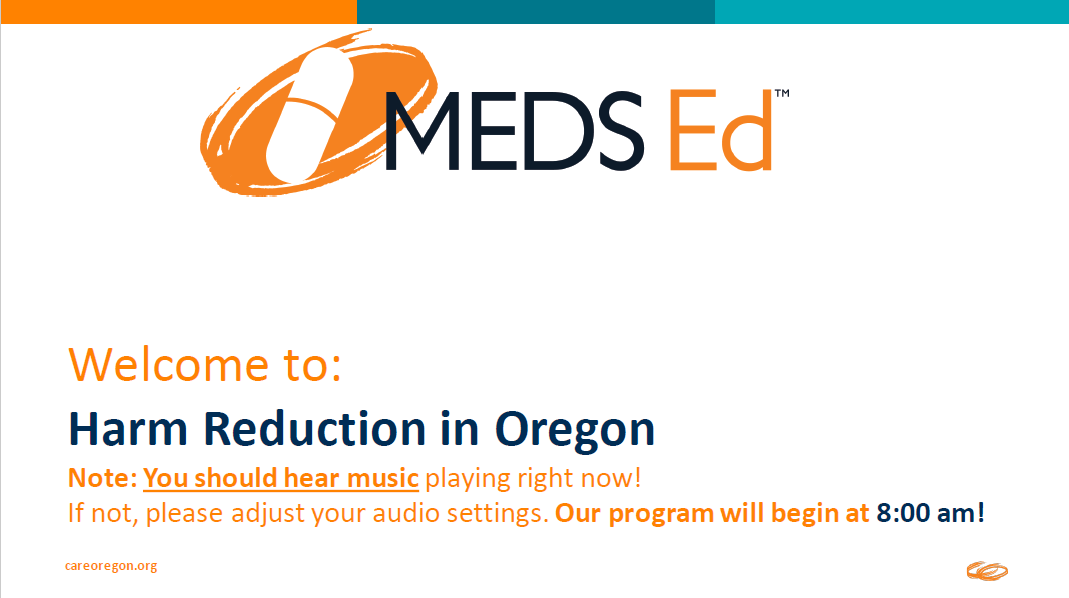
This session of CareOregon Pharmacy’s MEDS Ed program highlights harm reduction strategies, how to talk about drug user health, as well as overdose reversal training.
Click here to view the whole session
Key Session Takeaways
(click the link to view a clip):
- There are two different ways we talk about harm reduction: policies that advance social justice for people who use drugs, and the clinical practice that supports reducing substance use related harm to improve quality of life. Part 1 – 5:06
- While there has been a reduction in prescription opioid use, this has been accompanied by increases in deaths from heroin and fentanyl. Part 1 – 9:30
- Healthcare providers need to embrace Naloxone kits, sometimes reducing community overdoses by over 45%. Part 1 – 18:07
- It’s important to understand what harm reduction grew out of. Part 2 – 05:46
- Harm reduction is a tool akin to seatbelts or a bike helmet. Part 2 – 22:24
- What are some examples of harm reduction in practice? Part 2 – 25:29
- How do you talk to patients/clients about Naloxone and safer use? Part 2 – 41:45
- Examples of how language matters. Part 2 – 1:00:33
- Insight on the increasing need for harm reduction services within Multnomah County. Part 3 – 08:10
- Visualizing the sheer volume of syringes and supplies. Part 3 – 18:24
- Barriers and strategies. Part 3 – 20:42
- What you can do today. Part 3 – 34:01
- What are peer mentors? Part 4 – 1:43
- What makes peers different? Part 4 – 14:13
- How peers instill hope. Part 4 – 17:25
- Introducing Team HOW. Part 5 – 2:04
- What can peer outreach offer? Part 5 – 5:21
- What peer outreach does. Part 5 – 10:00
- Who are candidates for Naloxone co-prescribing? Part 6 – 3:19
- Prescribing call to action and Naloxone. Part 6 – 9:05
- Social Stigma. Part 6 – 11:21
- Barriers, concerns, and resources. Part 6 – 14:50
- Overdose basics. Part 7 – 1:51
- Recognizing and overdose. Part 7 – 3:43
- How to respond to an overdose. Part 7 – 4:48
- Preventing an overdose. Part 7 – 16:40
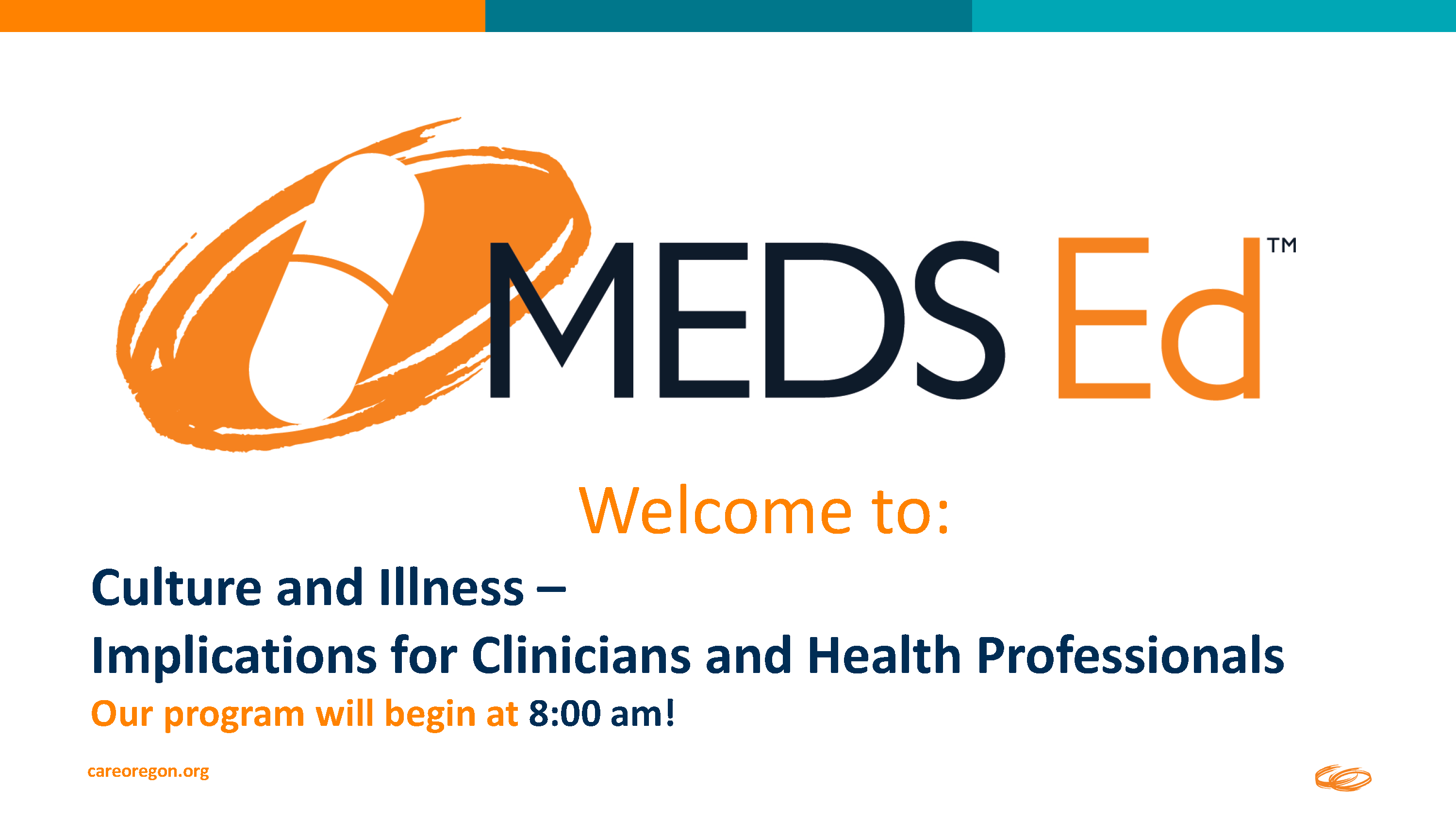
This session of CareOregon Pharmacy’s MEDS Ed program explores weaving cultural competence into our behaviors and policies, improving our cultural effectiveness and the lives of our patients.
Click here to view the whole session
Key Session Takeaways
(click the link to view a clip):
- Don’t be afraid to establish ground rules when having difficult conversations about diversity; tailor them to your personality. Part 1 – 7:04
- Bias comes into play when providing care or identifying/hiring talent; these biases are most often implicit or unconscious. Part 1 – 14:30
- Don’t be afraid to assess bias. One can identify current strengths, and areas where improvements can be made. Part 1 – 16:07
- Develop a value base for EDI; ultimately construe it in the clinician’s best interest, but with mutual benefits. We are doing it as much for us as for them. Part 1 – 20:17
- Focus on equity as a way of tailoring or individualizing care and understanding the patient context. Part 1 – 23:47
- Develop your own talking points and identify with whom specific arguments might resonate. Part 1 – 25:02
- Try to understand the patient in terms of their internal and external health determinants. See within-group differences, understand the categories or how we label people can inadvertently cause us to invoke new stereotypes otherwise. Part 3 – 5:29
- See diversity when you see people, not just certain people. Part 3 – 9:00
- We are all diverse and unique. Part 3 – 10:55
- Show yourself and others grace. This is a developmental process; we all start at different point; compare yourself to yourself over time. Part 3 – 48:22
- As with any body of knowledge, understand you’ll never exhaust the need to learn about diversity; cultures and contexts change over time and knowledge is always being developed. Part 3 – 49:26

This session of CareOregon Pharmacy’s MEDS Ed program explores the tremendous benefits and resources Community Health Workers can provide for both primary care clinicians and patients.
Click here to view the whole session
Key Session Takeaways
(click the link to view a clip):
- Understanding some of the roles and competencies for Community Health Workers. Part 1 – 20:17
- The role of Community Health Worker has been evolving since the 1950s. Part 1 – 25:38
- How systems benefit from working with Community Health Workers. Part 1 – 36:08
- A moving example of what can draw someone into becoming a Community Health Worker. Part 2 – 7:20
- How Community Health Workers are referred to patients who need them. Part 2 – 16:35
- Community Health Workers can help in many ways, including getting healthy produce to clients. Part 2 – 20:00
- Evolution of the Community Supported Agriculture program. Part 2 – 24:36
- What do relationships between Community Health Workers and other team members look like? Part 2 – 36:58
- Understanding Mobile Integrated Healthcare. Part 3 – 5:01
- Making an impact with behavioral health and substance use disorders. Part 3 – 10:51
- Examples that demonstrate success. Part 3 – 17:50
- Examples of a strong collaboration with pharmacists. Part 3 – 21:51
- What kind of CHW support do the CCOs provide? Part 4 – 2:30
- How does the role of the Traditional Health Worker Liaison support CHW work? Part 4 – 6:00

This session of CareOregon Pharmacy’s MEDS Ed program explores
how issues of racial and social disparities and environmental stress impact maternal health and conception; mental health/SUD-related concerns during pregnancy; how maternal health is affected by pre-conception care; potentially harmful medications;
social/emotional health for newborns and new mothers.
Click here to view the whole session
Key session takeaways
(click the link to view a clip):
- Virginia Garcia clinics serve 1 in every 13 residents of Washington and Yamhill counties – more than 50,000 patients. Part 1 – 7:50
- Virginia Garcia has prioritized hiring bilingual & bicultural staff, using data analysis, and integrating behavioral health into primary care. Part 1 – 14:15
- Implementing the CenteringPregnancy® program has resulted in outstanding obstetrics outcomes. Part 1 – 24:53
- Dental care for the pregnant patient, and family members, is an upstream approach to address the transmissible and preventable chronic disease of early childhood caries. Part 2 – 17:31
- Important oral health recommendations during pregnancy for patients: Part 2 – 31:44
- Pregnant patients to complete a dental visit if
- they have not seen a dentist during their pregnancy
- oral health problems were identified during the assessment
- Encourage good oral hygiene and associate oral health with other healthy habits
- nutrition
- tobacco cessation
- Inform patients that dentistry is safe during pregnancy and recommended for the health of both the patient and developing baby – that dentistry is safe during all three trimesters.
- Dental care request tool for any Health Share of Oregon, Jackson Care Connect or Columbia Pacific CCO patient. All OHP/Medicaid patients have comprehensive dental benefits. This tool helps connect your patient to their OHP dental plan for care coordination, simplifying the process for both you and your patient. Tool is accessible through the CareOregon Connect provider portal or OneHealthPort. Part 2 – 35:16
- The U.S. has the worst overall maternal and infant mortality rate and outcomes of the developed nations Part 3 – 21:13
- Black maternal mortality three times higher than white
- Native/Indigenous maternal mortality is more than twice as high as white
- There is a need for more skilled birth advocates for underserved and marginalized communities. Part 3 – 30:48
- The Community Doula Alliance was created to promote sustainable utilization and share resources. Part 3 – 53:12
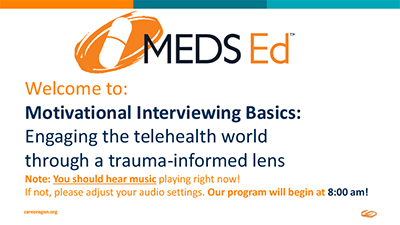
This session provides an overview Motivational Interviewing principles, suited for either the beginner or for those looking for a refresher and fresh perspective. CareOregon Training & Development Specialist Paul Carson will convene the session to highlight ways that MI is an effective communication tool, and in particular for patients with a background of trauma.
Click here to view the whole session
Key Session Takeaways
(click the link to view a clip):
- The ACE (Adverse Childhood Experiences) study established a strong relationship between abuse and traumatic experiences during childhood and later-life adult health, well-being, and death. Part 1 – 19:09
- Medication Trauma is medication complexity and lack of coordination that overwhelms the patient, caregivers and provider’s resources, creating fear, confusion and error, which leads to poor adherence, compliance and outcomes. Part 1 – 36:10
- Change is a process, not an event. Part 2 – 05:26
- Motivational Interviewing is made up of four core skills or “OARS.” Part 2 – 17:05
- Reflective Listening is the most important MI skill. Part 2 – 25:00
- Three parts of your MI “toolkit” you can still practice even when you don’t have a lot of time. Part 2 – 51:36
- A review of No-Lose Conflict Resolution. Part 3 – 06:45
- The difference between patient-owned problems and provider-owned problems. Part 3 – 11:40
- Recent Practical Case Examples – Part 3 – 37:17
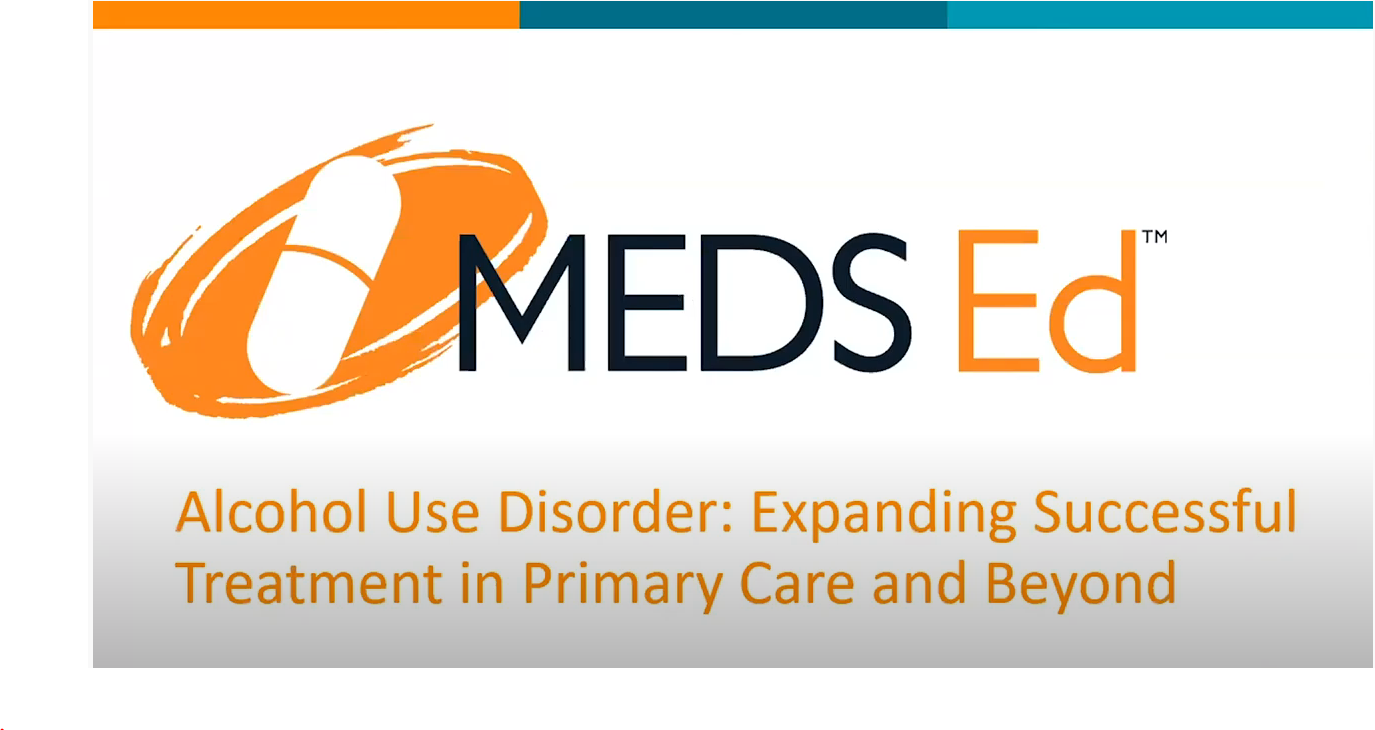
This session of CareOregon Pharmacy’s MEDS Ed program focuses on managing the complexities of Alcohol Use Disorder, including strategies for removing the fear and lack of comfort around AUD treatment; assessment, and treatment-based competencies;
the importance and under-utilization of medications in the treatment of AUD; engagement with behavioral health and community resources to assist with AUD treatment in a primary care setting.
Recorded on June 18th as a remote web-cast in Portland,
OR.
Click here to view the whole session
Key session takeaways
- Defining binge-drinking & heavy alcohol use for both women and men. Part 1 – 24:19
- Alcohol Use Disorder is highly prevalent and often goes untreated (1 in 11). Part 1 – 27:52
- 5 Oregonians die from alcohol use every day – twice as many as opioid deaths. Part 1 – 29:18
- Gray Area Drinking – drinking among women has skyrocketed. Part 1 – 31:10
- Naltrexone and other medications for treatment – oral Naltrexone should be used much more often in your practice! Part 1 – 35:55
- Treatment engagement tends to be higher in a behavioral health setting. Part 2 – 4:08
- Oregon is drinking its way through the coronavirus crisis. Part 2 – 9:10
- Review of the DSM-5 criteria for AUD. Part 2 – 14:00
- Clinical Practice Guidelines on Alcohol Withdrawal Management. Part 2 – 39:37
- What you can incorporate into your practice today. Part 2 – 50:52
- Alarming facts about Alcohol Use Disorder. Part 3 – 6:00
- Patients are far more willing to enter treatment within a primary care setting than within a specialty treatment center. Part 3 – 10:35
- Tips on using a Trauma-Informed Care approach, including the importance of using affirming language. Part 3 – 38:00
- Tips on helping patients reduce drinking – and remembering to check your biases. Part 3 – 47:15
- Information about project ANTECEDENT as a free resource to support all primary care clinics! Part 3 – 58:54
- How your CCO can support the work you’re doing around Alcohol Use Disorder. Part 4 – 00:44
- Additional assistance, technical support, and next steps. Part 4 – 6:59
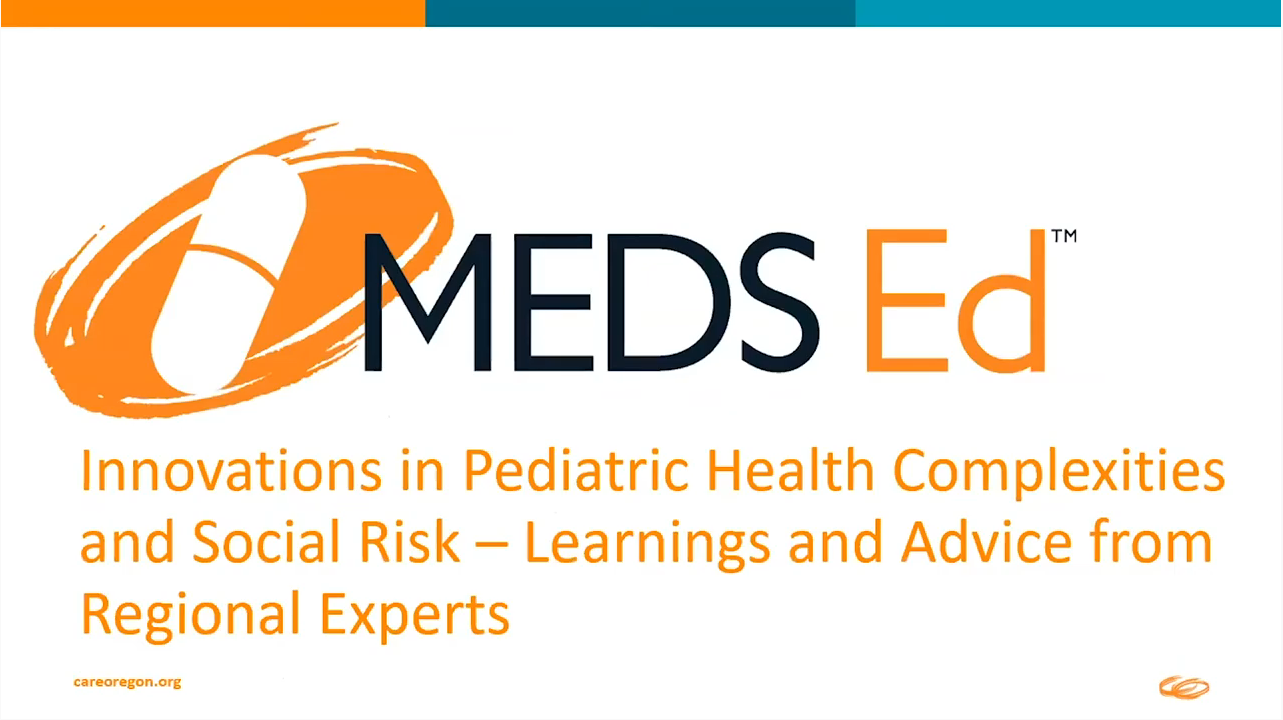
This session of CareOregon Pharmacy’s MEDS Ed program focuses
on managing children’s complex health conditions, including the impact of parental trauma, behavioral health integration, high-risk medications, improving family engagement and follow-through, and population data highlighting high-risk children.
Recorded on May 21st as a remote web-cast in Portland, OR.
Click here to view the whole session
Key session takeaways (click the link to view a clip):
- Parental Trauma can have an impact on a child’s developmental delays and social-emotional risk. Part 1 – 2:38
- Parents have new brain growth in the first six months after their child’s birth…UNLESS they are experiencing stress, which impairs frontal cortex development. Part 1 – 9:33
- A child whose parent has a high ACE score will have increased odds for behavioral and emotional problems. Part 1 – 22:45
- Positive relationships with providers help build resilience. Part 1 – 31:50
- Providers only see a small glimpse of the greater social complexity that creates barriers to engagement. Part 2 – 12:40
- The context of social determinants of health, inequities, and bad experiences with the healthcare system must be kept in mind when engaging with families, along with the perceptions and assumptions we have as providers. Part 2 – 55:52
- The top questionsto ask to help improve family follow-through and engagement. Part 2 – 1:04:35
- Patients and families often feel more comfortable and trusting of primary care providers, which can help reduce stigma. Part 3 – 2:00
- Which disorders cause PCPs to contact child psychiatric resources? Part 3 – 7:00
- What are the criteria for improving clinical practice? Part 3 – 27:45
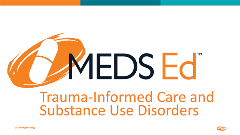 This session of CareOregon Pharmacy’s MEDS Ed program focuses on the intersection between psychological trauma and substance use disorders. Lydia Bartholow (DNP, PMHNP, CARN-AP) lays out the
scope of the issues, highlights the most effective and lasting forms of engagement and treatment, and provides and in-depth review of the importance of trauma-informed care and patient-centered systems when engaging people experiencing substance
use disorders.
This session of CareOregon Pharmacy’s MEDS Ed program focuses on the intersection between psychological trauma and substance use disorders. Lydia Bartholow (DNP, PMHNP, CARN-AP) lays out the
scope of the issues, highlights the most effective and lasting forms of engagement and treatment, and provides and in-depth review of the importance of trauma-informed care and patient-centered systems when engaging people experiencing substance
use disorders.
Recorded on December 13, 2019 at CareOregon (Portland, Oregon).
Click here to watch the seminar
Key session takeaways (click the link to view a clip):
- Long-term consequences of cortisol end up becoming the biggest chronic conditions that impact our life expectancy. Part 2 - 25:50
- Much of what we know about the connection between trauma and substance use disorders is based on the ACEs study. Part 3 - 6:07
- A central nervous system that has experienced trauma will look for outside sources to soothe. Part 3 - 13:55
- The brain that has experienced trauma has lower dopamine levels, looking for things to engage with that help overcome perceived threats to survival. Part 3 - 19:07
- Physiological withdrawal symptoms can mirror the neuro-hormonal landscape of revisiting a traumatic experience. Part 3 - 37:41
- Key elements of trauma-informed care are promoting safety and control. Part 4 - 00:28
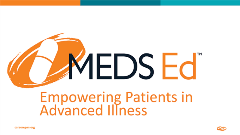 This
session of CareOregon Pharmacy’s MEDS Ed program touches on the positive impact that focusing on goals of care can make on patient outcomes, successful strategies for deprescribing pill burdens and potentially inappropriate medications,
and how leveraging the model of care shared by Housecall Providers and CareOregon can improve health outcomes and increase patient well-being, while reducing health care costs.
This
session of CareOregon Pharmacy’s MEDS Ed program touches on the positive impact that focusing on goals of care can make on patient outcomes, successful strategies for deprescribing pill burdens and potentially inappropriate medications,
and how leveraging the model of care shared by Housecall Providers and CareOregon can improve health outcomes and increase patient well-being, while reducing health care costs.
Recorded on November 21, 2019 at CareOregon (Portland, Oregon).
Click here to watch the seminar
Key session takeaways (click the link to view a clip):
- Palliative care patients are typically younger, in their 50s or 60s. In Oregon, if you have serious persistent mental illness, or if you’re experiencing homelessness, you die 20 years earlier than someone who doesn’t. Part 1 - 10:55
- Without relationships and security to help process trauma, people are left fragmented and held captive. Trusting relationships are the foundation of palliative work and most important therapeutic intervention. Part 1 - 15:53
- Focusing on positive aspects of a person’s past experiences and not just their past trauma can help strengthen engagement around goals of care. Part 2 - 24:30
- Pharmacist Leah Goeres shares her preferred method for deprescribing. Part 3 - 25:26
- Why is deprescribing so difficult? Part 3 - 33:05
- A guided tour of CareOregon’s Regional Care Teams structure. Part 4 - 24:50
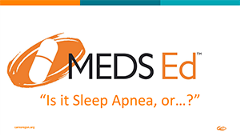 This session of CareOregon Pharmacy’s MEDS Ed program focuses on clarifying sleep disorder screening and diagnosis, how to help patients
through the challenges of CPAP usage and adherence and which medications pose greater risk for obstructive sleep apnea patients.
This session of CareOregon Pharmacy’s MEDS Ed program focuses on clarifying sleep disorder screening and diagnosis, how to help patients
through the challenges of CPAP usage and adherence and which medications pose greater risk for obstructive sleep apnea patients.
Recorded on July 26, 2019 at CareOregon (Portland, Oregon).
Click here to watch the seminar
Key session takeaways (click the link to view a clip):
- Prevalence is huge: 12% of the CareOregon population is impacted by sleep apnea. Part 1 - 11:40-12:15
- OSA treatment with CPAP has a major beneficial impact on comorbidities, quality of life and health outcomes, but to do so requires regular use (minimum four hours per night). Part 1 - 12:12-14:19
- It can be very difficult for patients to adjust to using and maintaining sleep equipment (e.g., CPAP). Strong patient support exists. Without that support, patients are likely to closet their machines and give up. Part 2 - 33:58-35:23
- Drowsy driving is a significant public health concern — 4% of drivers are drowsy behind the wheel every day. 36% admit to falling asleep behind the wheel of a moving vehicle. Part 3 - 26:13 – 29:25
- Due to the significant numbers of people affected, specialists need to collaborate with primary care clinical champions on DME support to better address this epidemic together. Part 2 - 47:35 - 48:48
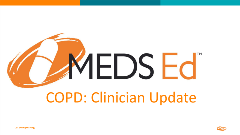 This session of CareOregon Pharmacy’s MEDS Ed program focuses on new simplified medication guidelines for treatment of COPD, effective demonstration of inhalers and DME supplies and insight into the role of the specialist and pulmonology
referral in coordinating treatment.
This session of CareOregon Pharmacy’s MEDS Ed program focuses on new simplified medication guidelines for treatment of COPD, effective demonstration of inhalers and DME supplies and insight into the role of the specialist and pulmonology
referral in coordinating treatment.
Recorded on March 1, 2019 at CareOregon (Portland, Oregon).
Click here to watch the seminar
Key session takeaways:
- CareOregon has a new COPD treatment pathway that simplifies effective treatment based on the GOLD guidelines and covered formulary agents.
- Smoking cessation is an important component of long-term strategies for COPD. Use your teams, including behavioral health clinicians, to help with this (using trauma-informed approaches).
- Inhaler technique needs to be assessed regularly. Watch the video for inhaler demos and links to education videos to share with patients.
- Pulmonary rehabilitation programs are a covered non-pharmacological benefit that are effective in patients with COPD.
- There is a template to help guide when to refer a patient to a pulmonology specialist. Also, please contact our metro primary care innovation team if you are interested in help with implementation of templated referral workflows within your EMR and primary care teams.
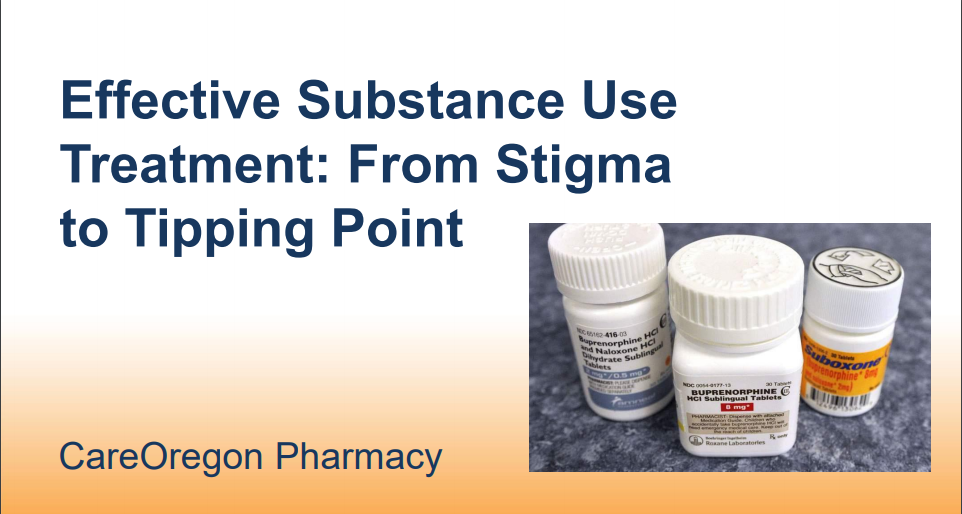 This session of CareOregon Pharmacy’s MEDS Ed program focuses on the science and use of medications as best practice for the treatment of opioid and alcohol use disorders, distinguishing
the barriers and myths about recovery treatment from evidence and effective treatment, Understanding the guidelines for effectively navigating high-risk patient referrals with a special focus on coordination between behavioral health and primary
care and planning next steps to support further implementation and improved access of MAT in our network.
This session of CareOregon Pharmacy’s MEDS Ed program focuses on the science and use of medications as best practice for the treatment of opioid and alcohol use disorders, distinguishing
the barriers and myths about recovery treatment from evidence and effective treatment, Understanding the guidelines for effectively navigating high-risk patient referrals with a special focus on coordination between behavioral health and primary
care and planning next steps to support further implementation and improved access of MAT in our network.
Click here to watch the seminar
Featured speakers:
- Paul Lewis, MD, MPH: Multnomah County Health Officer
- Andrew Mendenhall, MD, DABAM, DABFM: Senior Medical Director, Substance Use Disorder Services, Central City Concern
- Alison Noice, MA, CADC III: Deputy Director, CODA
- Amy Jo Cook: Community Paramedic, Clackamas Fire District #1
- Dan Hall: Community Paramedic, AMR
- Anthony Cheng, MD: OHSU South Waterfront
- Stacie Andoniadis: Primary Care Innovations Specialist, CareOregon
- Tanya Kapka, MD, MPH: Metro Medical Director, Network and Clinical Support, CareOregon
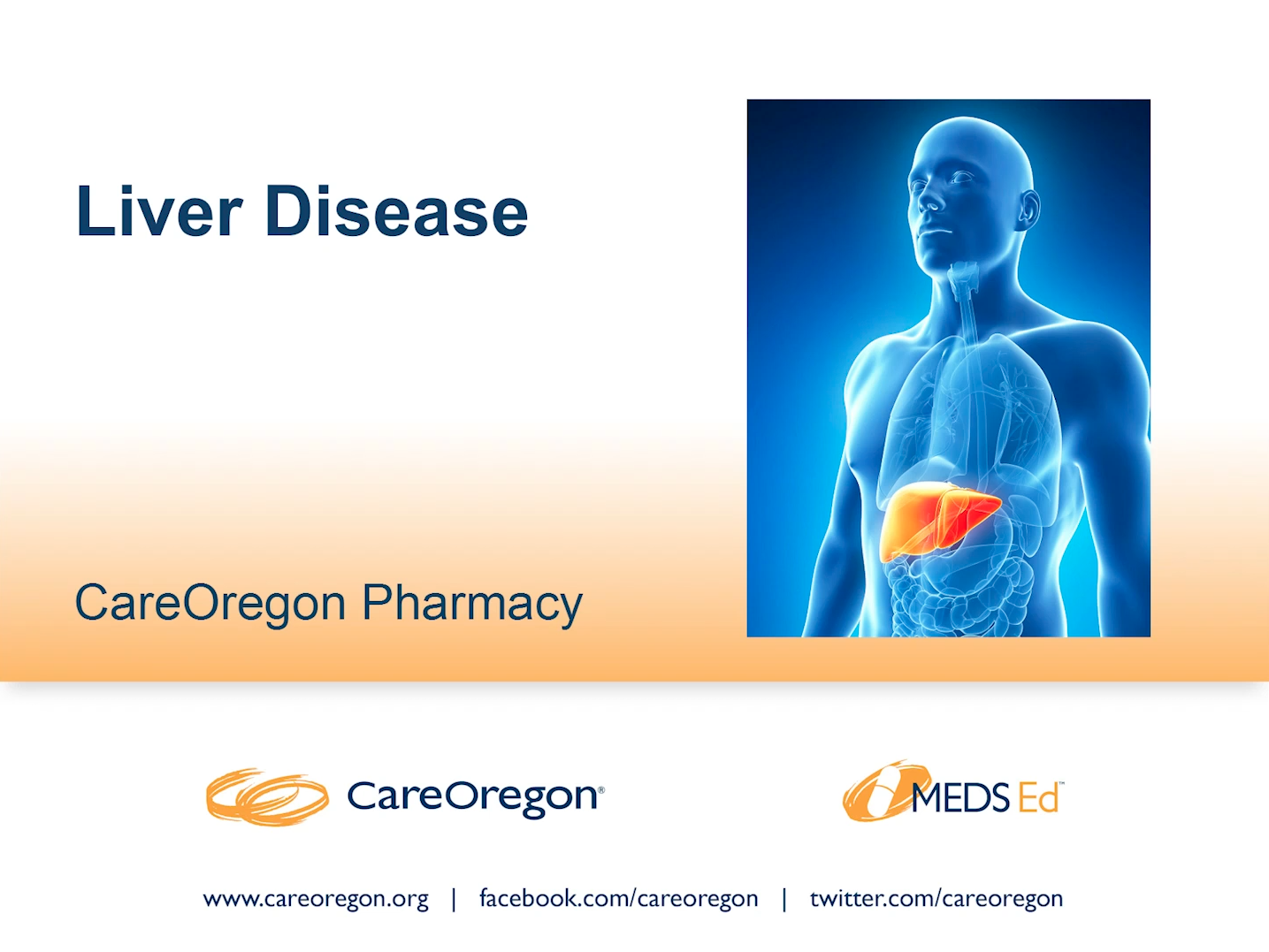 This session of CareOregon
Pharmacy’s MEDS Ed program features interactive discussions on diagnosis, assessment and management of chronic liver disease from the physician and nurse perspectives, as well as a review of medications used to treat hepatitis C and manage
complications of cirrhosis.
This session of CareOregon
Pharmacy’s MEDS Ed program features interactive discussions on diagnosis, assessment and management of chronic liver disease from the physician and nurse perspectives, as well as a review of medications used to treat hepatitis C and manage
complications of cirrhosis.
Click here to watch the seminar
Featured speakers:
- Atif Zaman, MD, MPH: Professor of Medicine, Oregon Health & Science University
- Karista Peabody RN, BS CMSRN: Hepatology Patient Care Coordinator, OHSU Hepatology
- Maddie Fry, PharmD: Post-graduate year 2 Pharmacist Resident, CareOregon
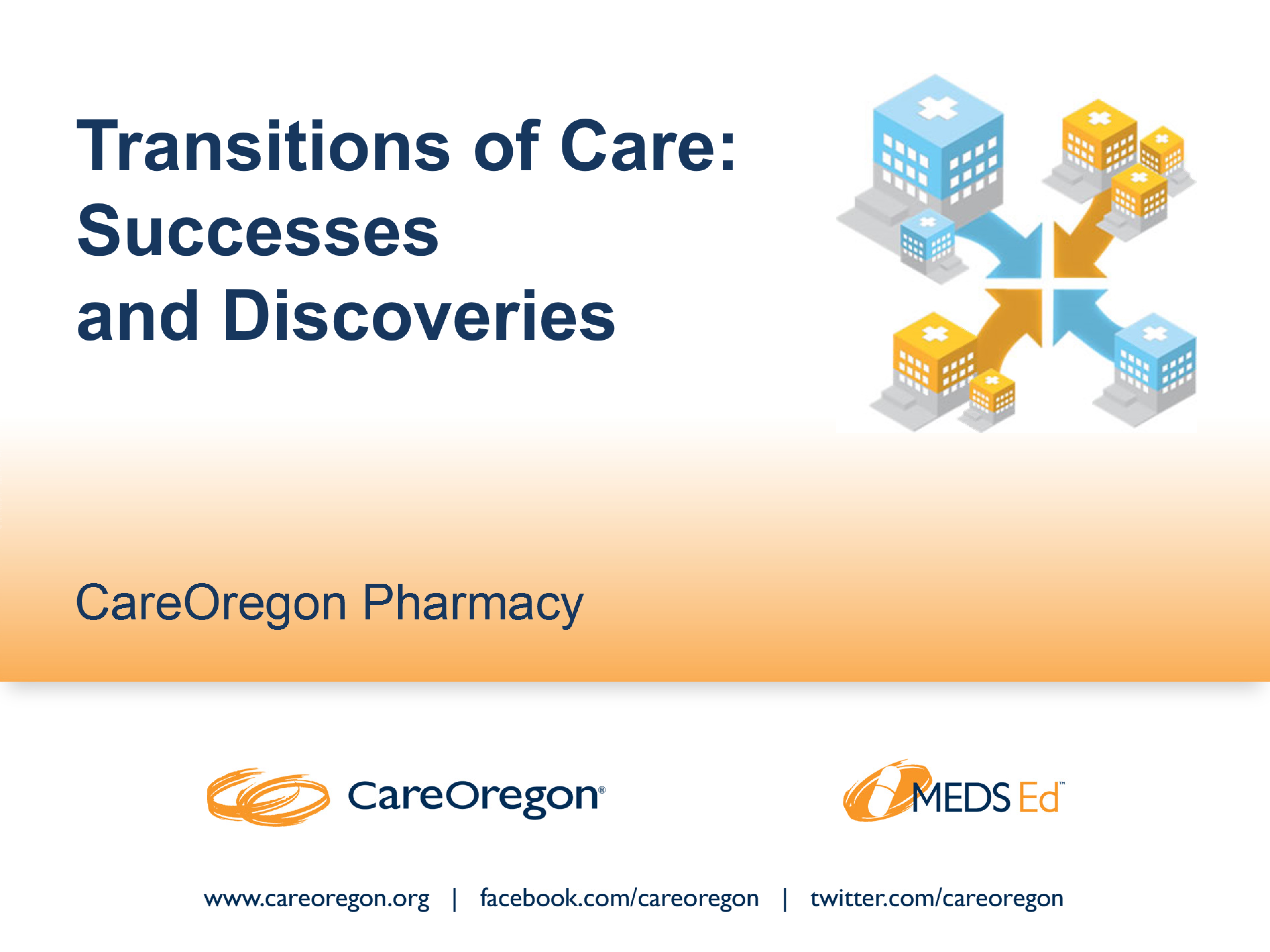 This session of CareOregon Pharmacy’s MEDS Ed program focuses on recent discoveries and lessons learned across transitional care environments, including hospital discharge, skilled nursing and Meds-to-Beds.
This session of CareOregon Pharmacy’s MEDS Ed program focuses on recent discoveries and lessons learned across transitional care environments, including hospital discharge, skilled nursing and Meds-to-Beds.
Click here to watch the seminar
Featured speakers:
- Jane Duck, RN, BSN: High Risk Populations Program Manager, CareOregon
- Mariah Alford, PharmD, BCPS: Pharmacy Clinical Supervisor, CareOregon
- Mai Tran, PharmD, BCACP, BCGP: CareOregon
- Anthony Neises, PharmD: Legacy Health
- Nate Semm, CSWA: Legacy Health
- Elizabeth Decker: RN Case Manager, Legacy Health
- Carlo De Gregorio: Health Assistant, Pioneers Care Team, Central City Concern
- Meryl Manley, RN, PCCN: Post-Acute Care Manager, Prestige Care
- Elizabeth Whitworth, MPH: PreManage Project Manager, CareOregon
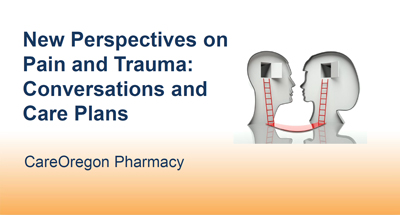 This session of CareOregon Pharmacy’s MEDS Ed program on pain management for health care professionals goes beyond pharmacological guidelines to examine the neurophysiology and language of pain as well as trauma-informed perspectives
on challenging patient conversations.
This session of CareOregon Pharmacy’s MEDS Ed program on pain management for health care professionals goes beyond pharmacological guidelines to examine the neurophysiology and language of pain as well as trauma-informed perspectives
on challenging patient conversations.
Content from Pharmacy Resident Cassandra Miller from CareOregon explains current trends in opioid utilization, benefit criteria and non-opioid alternatives.
Content from Nora Stern, from the Providence Persistent Pain Project, focuses on the relationship between pain and trauma, how pain changes the nervous system and how education can act as a treatment intervention.
Content from Lydia Anne M Bartholow, from Central City Concern’s Old Town Clinic, reviews trauma-informed care, care plans, patient and provider challenges when discussing pain, as well as techniques to improve these difficult conversations.
Click here to watch the seminar
Featured speakers:
- Lydia Anne M Bartholow, DNP, PMHNP, CARN-AP: Old Town Clinic, Central City Concern
- Nora Stern, MSPT: Providence Persistent Pain Project
- Cassandra Miller, PharmD, MS PGY-1: Managed Care Pharmacy Resident, CareOregon
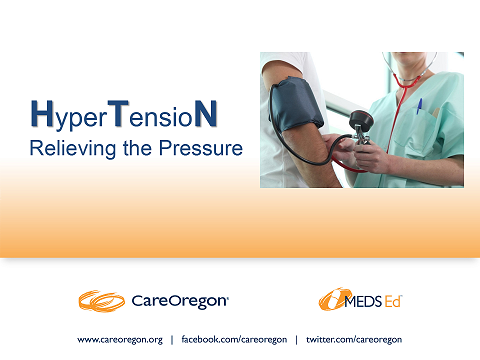 This session of CareOregon
Pharmacy’s MEDS Ed program for health care professionals focuses on treating hypertension, providing a multidisciplinary approach to effectively treating this complex disease state.
This session of CareOregon
Pharmacy’s MEDS Ed program for health care professionals focuses on treating hypertension, providing a multidisciplinary approach to effectively treating this complex disease state.
Content from Jose Rueda, from OHSU's Comprehensive Hypertension Center, reviews hypertension treatment trials and evidence-based guidelines, as well as causes of secondary hypertension.
Content from Pharmacist Christopher Blem, from Legacy Health Systems, focuses on medications and how they work, as well as ways to improve adherence.
Content from Dietician Julia Hanfling, from 3 Peaches Nutrition and Diabetes Coaching, explores who is at risk for hypertension, the role of sodium in high blood pressure, three main dietary recommendations and the importance of lifestyle factors.
Click here to watch the seminar
Featured speakers:
- Jose Rueda, MD: Director Comprehensive Hypertension Clinic, Division of Nephrology and Hypertension, OHSU
- Chris Blem, PharmD, BCACP: Legacy Medical Group, Emanuel
- Julia Hanfling, RD, CDE: 3 Peaches Nutrition and Diabetes Coaching
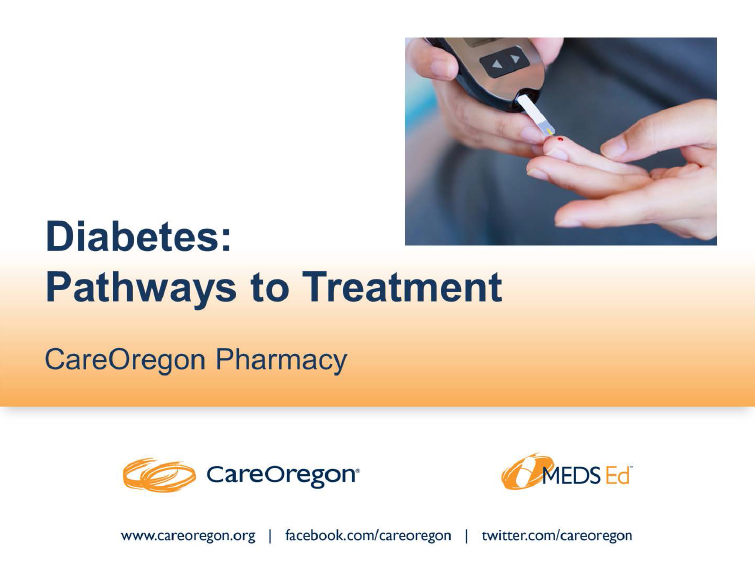 This session of CareOregon Pharmacy’s MEDS Ed program for health care professionals introduces the new diabetes treatment pathway, a more effective approach to diabetes management created in partnership with
area diabetes experts.
This session of CareOregon Pharmacy’s MEDS Ed program for health care professionals introduces the new diabetes treatment pathway, a more effective approach to diabetes management created in partnership with
area diabetes experts.
Content from Dr. Andrew Ahmann focuses on advancing therapy in Type 2 Diabetes to reduce A1C and improve complications. Use of GLP-1 agonists is featured in this segment.
Content from Dr. Leonard Bertheau examines managing complicated patient cases using new, impactful guidelines for this challenging disease state.
Content from Pharmacy Resident Sierra Fung dives into practical tips for navigating diabetic supplies and prescription coverage.
Recorded on September 20, 2017 at CareOregon (Portland, Oregon).
Click here to watch the seminar
Featured speakers:
- Andrew Ahmann, MD: Director of OHSU's Harold Schnitzer Diabetes Health Center
- Leonard Bertheau, DO: Diabetes and Endocrine Center, Adventist Health
- Sierra Fung, PharmD: Pharmacy Managed Care Resident, CareOregon
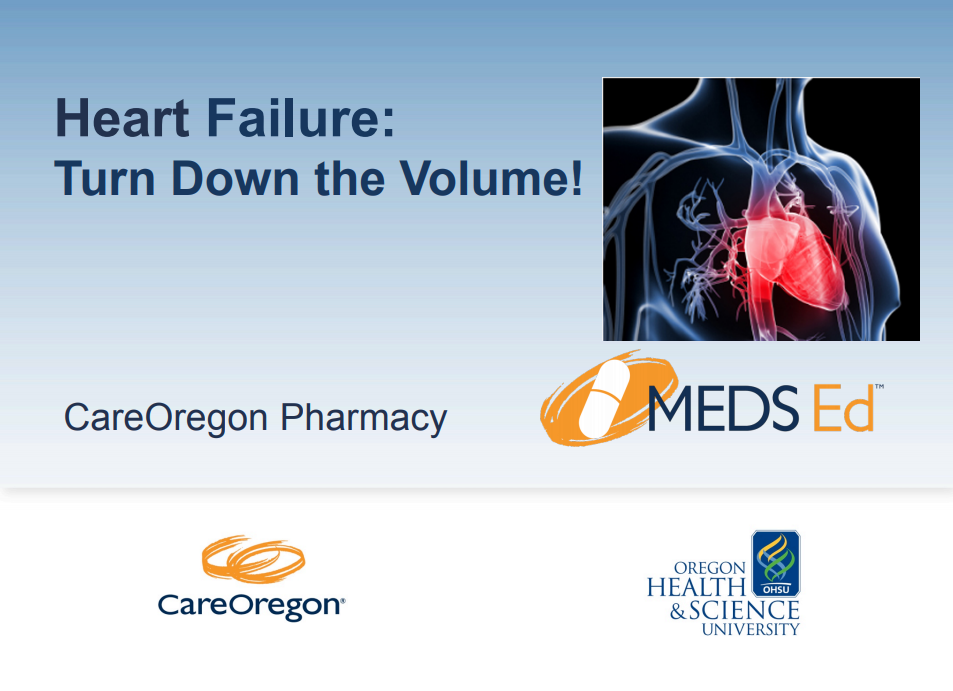 This session of CareOregon
Pharmacy’s MEDS Ed program for health care professionals focuses on heart failure, a disease of epidemic proportions. Approximately 5.7 million Americans are currently living with heart failure, with approximately one million hospitalized
each year.
This session of CareOregon
Pharmacy’s MEDS Ed program for health care professionals focuses on heart failure, a disease of epidemic proportions. Approximately 5.7 million Americans are currently living with heart failure, with approximately one million hospitalized
each year.
Content from Jayne Mitchell include types of heart failure, signs and symptoms, self-care and disease progression.
Recorded on April 20, 2017 at CareOregon (Portland, Oregon).
Click here to watch the seminar
Featured speakers:
- Jayne Mitchell, ANP-BC, CHFN: OHSU Heart Failure Program
- Pamela Chukwuleta, PharmD: Pharmacy Resident, CareOregon
- Kelly Hayes, AIC RN: CareOregon
- Laura Macias, RN-CHPN: Clinical Manager OPPC, Adventist Health Homecare Services
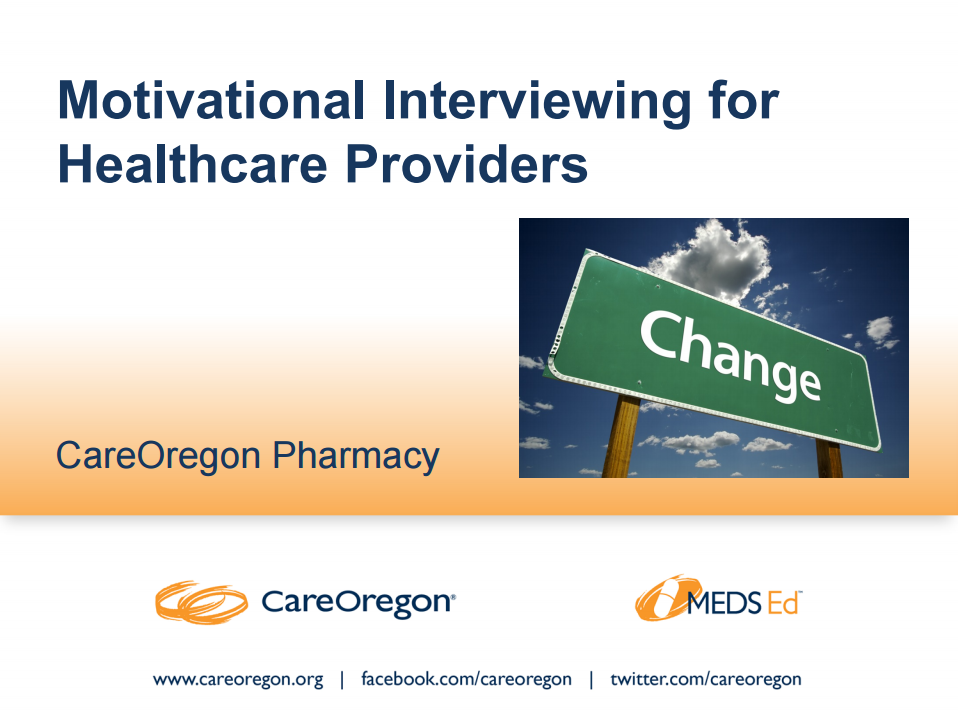 An interprofessional speaker panel — CareOregon Training and Development Specialist Paul Carson and Adventist Health Nurse Care Manager Erin Lemon lead an interactive workshop on the fundamentals
of motivational interviewing (MI). Attendees learned how to effectively incorporate MI techniques into a nurse’s busy workflow, while gaining an understanding of MI’s effectiveness in eliciting behavior change and improving communication
with patients who experience a background of trauma.
An interprofessional speaker panel — CareOregon Training and Development Specialist Paul Carson and Adventist Health Nurse Care Manager Erin Lemon lead an interactive workshop on the fundamentals
of motivational interviewing (MI). Attendees learned how to effectively incorporate MI techniques into a nurse’s busy workflow, while gaining an understanding of MI’s effectiveness in eliciting behavior change and improving communication
with patients who experience a background of trauma.
Click here to watch the seminar
Featured speakers:
- Paul Carson, BA: Training and Development Specialist, CareOregon
- Erin Lemon, BSN, RN, CCDS: Adventist Health
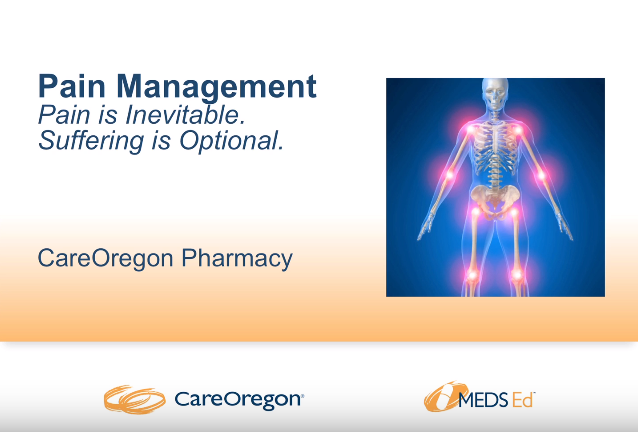 Clinicians discuss treating chronic pain and ways to talk with patients about their pain management regimens. They describe how to screen, recognize and triage high-risk symptoms associated with
pain medications.
Clinicians discuss treating chronic pain and ways to talk with patients about their pain management regimens. They describe how to screen, recognize and triage high-risk symptoms associated with
pain medications.
Click here to watch the seminar
Featured speakers:
- Dr. Rachel Solotaroff: Medical Director, Central City Concern Chair, CareOregon Metro Chronic Pain/Chemical Dependency Task Force
- Tara Berkson, PharmD: MEDS Ed Coordinator, CareOregon
- Nadejda Razi-Robertson, LCSW: Behavioral Health Consultant
Psychiatrist John K. Bischof, MD, discusses the disease and therapy options for patients coping with depression. We get the patient perspective from David Lee Greenlee, and Bridget Bradley from Pacific University School of Pharmacy gives a medication review.
Click here to watch the seminar
Featured speakers:
- John K. Bischof, MD: Psychiatric Medical Director, Old Town Recovery Center, Central City Concern
- David Lee Greenlee
- Bridget Bradley, PharmD, BCPP: Pacific University School of Pharmacy, Virginia Garcia Memorial Health Center
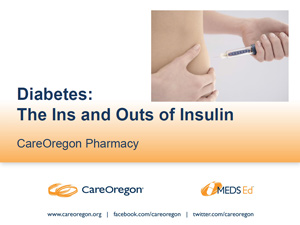 An interprofessional speaker panel — Adventist Health Diabetologist Dr. Leonard Bertheau and Tara Berkson, PharmD lead interactive discussions on navigating the latest best practices when
caring for complex and high-risk patients with diabetes. Certified Diabetes Educator and RN Cheryl Ortner shares her insights on educating patients about lifestyle modifications and medication use.
An interprofessional speaker panel — Adventist Health Diabetologist Dr. Leonard Bertheau and Tara Berkson, PharmD lead interactive discussions on navigating the latest best practices when
caring for complex and high-risk patients with diabetes. Certified Diabetes Educator and RN Cheryl Ortner shares her insights on educating patients about lifestyle modifications and medication use.
Click here to watch the seminar
Featured speakers:
- Leonard Bertheau, DO: Diabetes and Endocrine Center, Adventist Health
- Tara Berkson, PharmD: MEDS Ed Coordinator, CareOregon
- Cheryl Ortner, RN, MSN, CDE: Diabetes and Endocrine Center, Adventist Health
Key Session Takeaways
(click the link to view a clip):
Part 1
- The difference between jail and prison – 1:18
- Map of DOC locations across Oregon – 2:27
- Intake process – 4:25
- Ongoing mental health care – 7:19
- Levels of care – 14:55
- Mental health codes – 17:24
- Level of functioning – 18:40
- Behavioral health levels of care – 21:36
- Substance use disorder treatment selection and placement – 22:50
- Co-occurring disorders treatment – 26:08
- Chronic disease model for SUD treatment – 27:29
- Admin team contact information – 29:00
Part 2
- About the DOC Release Planning Team – 0:25
- Release planning timeline – 4:30
- Reentry benefits – 11:56
- Reentry classes – 20:41
- One-on-one services – 34:15
- Work Source Reentry program and Inside Out network – 36:13
- Release planning team contact information – 41:11
- Beginning of Q&A – 41:43
- Volume of people working with Reentry team – 42:04
- How reentry works with specialty populations, such as those with complex medical needs and those who are aging and older – 43:04
- Individuals releasing to homelessness - 45:11
- Considerations for those who have been incarcerated 15+ years - 47:09
- Care coordination with primary care, behavioral health, and health plan - 51:37
- Medications at time of release – 57:15
- Medications for substance use disorders – 58:55
- Utilization of therapy and crisis services during incarceration - 1:02:42
Key Session Takeaways
(click the link to view a clip):
- MOUD and mortality reduction: Part 1 - 5:20
- Barriers to MOUD: Part 1 – 6:57
- Buprenorphine basics: Part 1 – 9:49
- Myth #1 – One can’t achieve pain control while on buprenorphine. Fact – It is possible to achieve pain control with buprenorphine! Part 1 – 11:48
- Fentanyl in the drug supply: Part 1 – 13:05
- Overview of buprenorphine transition options: Part 1 – 13:52
- Standard dosing option: Part 1 – 16:40
- Low dosing option: Part 1 – 18:08
- High dosing option: Part 1 – 19:22
- Standard dose initiation: Part 1 – 20:07
- Low dose initiation: Part 1 – 21:18
- Example patient dosing table: Part 1 – 25:41
- High dose initiation: Part 1 – 26:34
- CA Bridge Buprenorphine Self-Start Guide: Part 1 – 27:24
- Low-to-high dose initiation: Part 1 – 28:17
- Adjunct medications for opioid withdrawal: Part 1 – 30:10
- Long term dosing: Part 1 – 32:50
- Myth #2 – The maximum dose of buprenorphine is 24mg. Fact – One can use up to 32mg of buprenorphine, when appropriate: Part 1 - 33:02
- Buprenorphine administration technique: Part 1 - 34:36
- Myth #3 - Patients who use multiple substances should not use buprenorphine. Fact- Patients who use multiple substances are often able to use buprenorphine– Part 1 37:45
- Benzodiazepines and buprenorphine: Part 1 – 39:15
- Co-occurring mental health disorders: Part 1 – 45:02
- Buprenorphine and stimulants: Part 1 – 50:37
- Buprenorphine and cannabis: Part 1 – 53:39
- General approach for those using multiple substances: Part 1 – 56:20
- Pros and cons of injectable ER buprenorphine: Part 2 – 0:10
- Injectable ER buprenorphine options: Part 2 – 2:52
- Sublocade pharmacokinetics: Part 2 – 3:43
- Sublocade serum levels: Part 2 – 5:48
- Sublocade starts: Part 2 – 7:30
- Sublocade updates: Part 2 – 9:52
- Sublocade missed doses: Part 2 – 13:42
- Brixadi pharmacokinetics: Part 2 – 14:56
- Brixadi serum levels: Part 2 – 17:17
- Brixadi starts/dose titration: Part 2 – 18:52
- Brixadi dosing: Part 2 – 20:26
- Serum levels of Brixadi – daily, weekly, monthly: Part 2 - 23:04
- Switching between products: Part 2 – 27:23
- Things to consider when choosing formulation: Part 2 – 29:24
- Injectable to taper off sublingual: Part 2 – 31:16
- Steps to obtaining in clinic: Part 2 – 32:57
- Naloxone: Part 2 – 36:23
- Audience question: Are there any medications for methamphetamine use disorder? Part 2 – 38:32
- Audience question: Contingency management overview: Part 2 – 42:22
- Audience question: Is it common to need to give multiple Narcan/naloxone doses in an overdose event?: Part 2 – 44:54
- Audience question: Use of bupropion in patients with severe congestive heart failure related to methamphetamine?: Part 2 – 44:47
- Audience question: If naloxone is expired, is it still safe to administer?: Part 2 – 49:28
This session of CareOregon Pharmacy’s MEDS Ed program focuses on what we know about stigma and how it impacts people who use substances, most specifically within health care.
Key Session Takeaways
(click the link to view a clip):
- Training context: the opioid overdose epidemic: Part 1 – 12:06
- Meeting patient needs: Part 1 – 18:13
- Client experience around tapers: Part 1 – 36:17
- How stigma delays access to care: Part 1 – 53:05
- Trauma-Informed Care 101: Part 2 – 1:01:44
- The evidence for Trauma-Informed Care: Part 2 – 1:13:59
- The Trauma-Informed Difficult Conversations Road Map: Part 3 – 1:26:18
- The Most Important Takeaway: Focus on Care and Safety: Part 3 – 1:48:06
- When hard feelings without reacting to them: Part 3 – 1:59:34
- Q&A: Part 4 – 2:13:36
This session of CareOregon Pharmacy’s MEDS Ed program focuses on what we know about stigma and how it impacts people who use substances, most specifically within health care.
Key Session Takeaways
(click the link to view a clip):
- Discussing positive media depictions of characters involving SUD: Part 1 – 15:05
- Medical evidence – stigmatization as a predictor of dependence: Part 1 – 27:18
- Stigma towards bereavement – blaming the deceased: Part 1 – 36:36
- When stigma and isolation encourages further drug taking: Part 1 – 40:07
- How people change their behavior to avoid stigma in healthcare setting: Part 1 – 45:18
- Narratives we might carry, regardless of evidence – true or false: Part 1 – 49:00
- Discussing positive media depictions of BIPOC characters involving recovery: Part 1 – 57:50
- Structural and interpersonal barriers to access care among African Americans: Part 1 – 1:03:50
- The layers of the types of stigma – structural, interpersonal, self-stigma: Part 2 – 00:00
- Recap of the layers of stigma: Part 2 – 19:16
- Actionable steps around language: Part 2 – 20:11
- Medical language to use and avoid: Part 2 – 28:48
- Notes on language to help make effective change – connect, don’t correct: Part 2 – 32:20
- Actionable skill-building – Elicit, Provide, Elicit: Part 2 – 34:32
- Q&A: Part 3
This session of CareOregon Pharmacy’s MEDS Ed program focuses on what we know about stigma and how it impacts people who use substances, most specifically within health care.
Key Session Takeaways
(click the link to view a clip):
- Substance Use trends – including Oregon-specific; overdose data: Part 1 – 9:00
- Youth fentanyl deaths growing 4x faster than U.S. as a whole, increased by 550%: Part 1 – 13:47
- The risk of developing a substance use disorders is greater for those who initiate use in adolescence: Part 1 – 16:16
- What’s different about the teen brain: Part 1 – 18:27
- Optimistic bias – adolescent belief of invincibility – identity vs. role confusion: Part 1 – 21:28
- Neurobiology and Risk Factors: Part 1 – 24:24
- Screening Tools: Part 1 – 34:32
- Guidance on the importance of Integration: Part 1 – 40:08
- Developmental Considerations for Adolescents and Their Relationship to Substance Use: Part 2 – 7:06
- What doesn’t work: Part 2 – 12:20
- What does work: Part 2 – 13:44
- The importance of Motivational Interviewing: Part 2 – 16:14
- Adverse Childhood Experiences and Positive Childhood Experience interventions: Part 2 – 23:53
- Recovery Oriented Systems of Care: Part 2 – 30:00
- Goals of School Based Health Centers and their services - locations: Part 3 – 4:37
- How School Based Health differs from the School Nurse: Part 3 – 10:18
- Eligibility criteria: Part 3 – 11:46
- Screening and Education: Part 3 – 12:38
- Dispensing: Part 3 – 27:53
- Urgent overdose prevention takeaways: Part 3 – 35:15
- Q&A: Part 4
This session of CareOregon Pharmacy’s MEDS Ed program focuses on the challenges of maintaining access to health care faced by people released from jail correctional facilities.
Key Session Takeaways
(click the link to view a clip):
- Differences between jail and prison, including average length of stay: Part 1 – 4:46
- Things that impact transitions: Part 1 – 8:44
- Types of care services available in custody: Part 1 – 13:46
- How language makes a difference: Part 1 – 16:23
- Dealing with COVID: Part 1 – 22:51
- Social Determinants of Health and transition services: Part 1 – 30:22
- Nurse perspective – the rewards of seeing people do better: Part 2 – 00:51
- Length of stay and Measure 11 crimes: Part 2 – 5:15
- Mental Health Care, Crisis Management, Right to Refuse: Part 2 – 18:24
- Substance Use & Withdrawal Management: Part 2 – 23:42
- Release Planning: Part 2 – 25:57
- Jail to community transitions: Part 3 – 3:04
- Stigma during transitions: Part 3 – 8:03
- Peer support: Part 3 – 19:08
- Peer perspective: Part 4 – 12:10
- Panel Q&A segment: Part 5 – 00:29
This session focuses on the impactful work and learnings of the Zero Overdose initiative, a vision of ending overdose deaths in our area.
Key Session Takeaways
(click the link to view a clip):
- Understanding supportive housing: Part 1 – 11:54
- Overdose risk increases in isolated settings: Part 1 – 25:02
- Improving care coordination: Part 1 – 35:34
- Implementation of the Zero Overdose initiative: Part 2 – 45:25
- What’s been done – Overdose prevention and aftercare: Part 2 – 1:00:34
- Initial data and outcomes: Part 2 – 1:17:40
- Success stories: Part 2 – 1:24:30
- Recommendations: Part 2 – 1:35:23
- Q&A Discussion: Part 3 – 1:42:42
This session of CareOregon Pharmacy’s MEDS Ed program focuses on why an understanding of substance use disorder is integral to hospice, palliative care, and all physical health practices.
Key Session Takeaways
(click the link to view a clip):
- Overcoming the “hidden curriculum” of SUD stigma: Part 1 – 9:06
- Reviewing the racism-tinged history of substance use disorder criminalization as we move towards a more evidence-based, compassionate approach: Part 1 – 30:50
- Building blocks to support more compassionate and open-hearted care for patients at any stage of their disease process: Part 1 – 40:15
- Moving towards ethical, integrated care: Part 2 – 21:40
- Considerations and resources to get us there: Part 2 – 24:50
- Newly established palliative care benefit requirements: Part 3 – 7:38
- Screening, next steps, and approach to care: Part 3 – 10:24
This session of CareOregon Pharmacy’s MEDS Ed program provides an enlightening fresh perspective on navigating pharmacy benefits.
Key Session Takeaways
(click the link to view a clip):
- Mortality rates have increased a lot from fentanyl's arrival in the drug supply in 2019: Part 1 – 11:11
- Folks will likely start injecting again soon: Part 1 – 18:50
- The emergence of Xylazine: Part 1 – 20:55
- Responding to fentanyl requires adapting to its unique properties: Part 1 – 23:50
- There is no “one-size-fits-all” approach to fentanyl>buprenorphine transitions: Part 2 – 23:55
- Know your patient before choosing an induction strategy: (assess use pattern, social situation, medical comorbidities): Part 2 – 24:08
- Schedule adjunctive comfort medications: Part 2 – 34:43
- Optimize non-pharmaceutical supports (including a whole lotta LOVE): Part 2 – 44:04
- High Tolerance Methadone Induction: Part 3 – 13:57
- Buprenorphine Administration in the hospital: Part 3 – 23:06
- Pregnancy and postpartum OD: Part 3 – 34:33
This session of CareOregon Pharmacy’s MEDS Ed program explores the importance of prescribing consistency for Behavioral Health and Substance Use Disorder medications during pregnancy.
Click here to view the whole sessionKey Session Takeaways
(click the link to view a clip):
- Substance Use Disorder changes the way people think: Part 1 – 5:23
- SUD and gender differences: Part 1 – 19:02
- Medications for OUD Used in Pregnancy: Part 1 – 30:23
- Opioid Withdrawal – Neonatal Abstinence (NAS) and Withdrawal (NOWS) syndromes: Part 1 – 49:15
- Alcohol Use Disorders in pregnancy: Part 1 – 53:00
- Key Takeaway Review: Part 1 – 58:55
- Sudden Stops are risky: Part 2 – 1:45
- Planning and Categories: Part 2 – 6:42
- Medication and breastmilk – risk vs. benefits: Part 2 – 15:06
- Medication dosages and timing: Part 2 – 18:50
- Substance Use: Part 2 – 24:25
- Depression, anxiety, bipolar disorder: Part 2 – 27:44
- Deprescribing: Part 2 – 44:40
- Panelists Q&A Segment: Part 3 – 00:00

This session of CareOregon Pharmacy’s MEDS Ed program highlights harm reduction strategies, how to talk about drug user health, as well as overdose reversal training.
Click here to view the whole session
Key Session Takeaways
(click the link to view a clip):
- There are two different ways we talk about harm reduction: policies that advance social justice for people who use drugs, and the clinical practice that supports reducing substance use related harm to improve quality of life. Part 1 – 5:06
- While there has been a reduction in prescription opioid use, this has been accompanied by increases in deaths from heroin and fentanyl. Part 1 – 9:30
- Healthcare providers need to embrace Naloxone kits, sometimes reducing community overdoses by over 45%. Part 1 – 18:07
- It’s important to understand what harm reduction grew out of. Part 2 – 05:46
- Harm reduction is a tool akin to seatbelts or a bike helmet. Part 2 – 22:24
- What are some examples of harm reduction in practice? Part 2 – 25:29
- How do you talk to patients/clients about Naloxone and safer use? Part 2 – 41:45
- Examples of how language matters. Part 2 – 1:00:33
- Insight on the increasing need for harm reduction services within Multnomah County. Part 3 – 08:10
- Visualizing the sheer volume of syringes and supplies. Part 3 – 18:24
- Barriers and strategies. Part 3 – 20:42
- What you can do today. Part 3 – 34:01
- What are peer mentors? Part 4 – 1:43
- What makes peers different? Part 4 – 14:13
- How peers instill hope. Part 4 – 17:25
- Introducing Team HOW. Part 5 – 2:04
- What can peer outreach offer? Part 5 – 5:21
- What peer outreach does. Part 5 – 10:00
- Who are candidates for Naloxone co-prescribing? Part 6 – 3:19
- Prescribing call to action and Naloxone. Part 6 – 9:05
- Social Stigma. Part 6 – 11:21
- Barriers, concerns, and resources. Part 6 – 14:50
- Overdose basics. Part 7 – 1:51
- Recognizing and overdose. Part 7 – 3:43
- How to respond to an overdose. Part 7 – 4:48
- Preventing an overdose. Part 7 – 16:40

This session provides an overview Motivational Interviewing principles, suited for either the beginner or for those looking for a refresher and fresh perspective. CareOregon Training & Development Specialist Paul Carson will convene the session to highlight ways that MI is an effective communication tool, and in particular for patients with a background of trauma.
Click here to view the whole session
Key Session Takeaways
(click the link to view a clip):
- The ACE (Adverse Childhood Experiences) study established a strong relationship between abuse and traumatic experiences during childhood and later-life adult health, well-being, and death. Part 1 – 19:09
- Medication Trauma is medication complexity and lack of coordination that overwhelms the patient, caregivers and provider’s resources, creating fear, confusion and error, which leads to poor adherence, compliance and outcomes. Part 1 – 36:10
- Change is a process, not an event. Part 2 – 05:26
- Motivational Interviewing is made up of four core skills or “OARS.” Part 2 – 17:05
- Reflective Listening is the most important MI skill. Part 2 – 25:00
- Three parts of your MI “toolkit” you can still practice even when you don’t have a lot of time. Part 2 – 51:36
- A review of No-Lose Conflict Resolution. Part 3 – 06:45
- The difference between patient-owned problems and provider-owned problems. Part 3 – 11:40
- Recent Practical Case Examples – Part 3 – 37:17

This session of CareOregon Pharmacy’s MEDS Ed program focuses on managing the complexities of Alcohol Use Disorder, including strategies for removing the fear and lack of comfort around AUD treatment; assessment, and treatment-based competencies;
the importance and under-utilization of medications in the treatment of AUD; engagement with behavioral health and community resources to assist with AUD treatment in a primary care setting.
Recorded on June 18th as a remote web-cast in Portland,
OR.
Click here to view the whole session
Key session takeaways
- Defining binge-drinking & heavy alcohol use for both women and men. Part 1 – 24:19
- Alcohol Use Disorder is highly prevalent and often goes untreated (1 in 11). Part 1 – 27:52
- 5 Oregonians die from alcohol use every day – twice as many as opioid deaths. Part 1 – 29:18
- Gray Area Drinking – drinking among women has skyrocketed. Part 1 – 31:10
- Naltrexone and other medications for treatment – oral Naltrexone should be used much more often in your practice! Part 1 – 35:55
- Treatment engagement tends to be higher in a behavioral health setting. Part 2 – 4:08
- Oregon is drinking its way through the coronavirus crisis. Part 2 – 9:10
- Review of the DSM-5 criteria for AUD. Part 2 – 14:00
- Clinical Practice Guidelines on Alcohol Withdrawal Management. Part 2 – 39:37
- What you can incorporate into your practice today. Part 2 – 50:52
- Alarming facts about Alcohol Use Disorder. Part 3 – 6:00
- Patients are far more willing to enter treatment within a primary care setting than within a specialty treatment center. Part 3 – 10:35
- Tips on using a Trauma-Informed Care approach, including the importance of using affirming language. Part 3 – 38:00
- Tips on helping patients reduce drinking – and remembering to check your biases. Part 3 – 47:15
- Information about project ANTECEDENT as a free resource to support all primary care clinics! Part 3 – 58:54
- How your CCO can support the work you’re doing around Alcohol Use Disorder. Part 4 – 00:44
- Additional assistance, technical support, and next steps. Part 4 – 6:59
 This session of CareOregon Pharmacy’s MEDS Ed program focuses on the intersection between psychological trauma and substance use disorders. Lydia Bartholow (DNP, PMHNP, CARN-AP) lays out the
scope of the issues, highlights the most effective and lasting forms of engagement and treatment, and provides and in-depth review of the importance of trauma-informed care and patient-centered systems when engaging people experiencing substance
use disorders.
This session of CareOregon Pharmacy’s MEDS Ed program focuses on the intersection between psychological trauma and substance use disorders. Lydia Bartholow (DNP, PMHNP, CARN-AP) lays out the
scope of the issues, highlights the most effective and lasting forms of engagement and treatment, and provides and in-depth review of the importance of trauma-informed care and patient-centered systems when engaging people experiencing substance
use disorders.
Recorded on December 13, 2019 at CareOregon (Portland, Oregon).
Click here to watch the seminar
Key session takeaways (click the link to view a clip):
- Long-term consequences of cortisol end up becoming the biggest chronic conditions that impact our life expectancy. Part 2 - 25:50
- Much of what we know about the connection between trauma and substance use disorders is based on the ACEs study. Part 3 - 6:07
- A central nervous system that has experienced trauma will look for outside sources to soothe. Part 3 - 13:55
- The brain that has experienced trauma has lower dopamine levels, looking for things to engage with that help overcome perceived threats to survival. Part 3 - 19:07
- Physiological withdrawal symptoms can mirror the neuro-hormonal landscape of revisiting a traumatic experience. Part 3 - 37:41
- Key elements of trauma-informed care are promoting safety and control. Part 4 - 00:28
 This session of CareOregon Pharmacy’s MEDS Ed program focuses on the science and use of medications as best practice for the treatment of opioid and alcohol use disorders, distinguishing
the barriers and myths about recovery treatment from evidence and effective treatment, Understanding the guidelines for effectively navigating high-risk patient referrals with a special focus on coordination between behavioral health and primary
care and planning next steps to support further implementation and improved access of MAT in our network.
This session of CareOregon Pharmacy’s MEDS Ed program focuses on the science and use of medications as best practice for the treatment of opioid and alcohol use disorders, distinguishing
the barriers and myths about recovery treatment from evidence and effective treatment, Understanding the guidelines for effectively navigating high-risk patient referrals with a special focus on coordination between behavioral health and primary
care and planning next steps to support further implementation and improved access of MAT in our network.
Click here to watch the seminar
Featured speakers:
- Paul Lewis, MD, MPH: Multnomah County Health Officer
- Andrew Mendenhall, MD, DABAM, DABFM: Senior Medical Director, Substance Use Disorder Services, Central City Concern
- Alison Noice, MA, CADC III: Deputy Director, CODA
- Amy Jo Cook: Community Paramedic, Clackamas Fire District #1
- Dan Hall: Community Paramedic, AMR
- Anthony Cheng, MD: OHSU South Waterfront
- Stacie Andoniadis: Primary Care Innovations Specialist, CareOregon
- Tanya Kapka, MD, MPH: Metro Medical Director, Network and Clinical Support, CareOregon
 This session of CareOregon Pharmacy’s MEDS Ed program on pain management for health care professionals goes beyond pharmacological guidelines to examine the neurophysiology and language of pain as well as trauma-informed perspectives
on challenging patient conversations.
This session of CareOregon Pharmacy’s MEDS Ed program on pain management for health care professionals goes beyond pharmacological guidelines to examine the neurophysiology and language of pain as well as trauma-informed perspectives
on challenging patient conversations.
Content from Pharmacy Resident Cassandra Miller from CareOregon explains current trends in opioid utilization, benefit criteria and non-opioid alternatives.
Content from Nora Stern, from the Providence Persistent Pain Project, focuses on the relationship between pain and trauma, how pain changes the nervous system and how education can act as a treatment intervention.
Content from Lydia Anne M Bartholow, from Central City Concern’s Old Town Clinic, reviews trauma-informed care, care plans, patient and provider challenges when discussing pain, as well as techniques to improve these difficult conversations.
Click here to watch the seminar
Featured speakers:
- Lydia Anne M Bartholow, DNP, PMHNP, CARN-AP: Old Town Clinic, Central City Concern
- Nora Stern, MSPT: Providence Persistent Pain Project
- Cassandra Miller, PharmD, MS PGY-1: Managed Care Pharmacy Resident, CareOregon
 An interprofessional speaker panel — CareOregon Training and Development Specialist Paul Carson and Adventist Health Nurse Care Manager Erin Lemon lead an interactive workshop on the fundamentals
of motivational interviewing (MI). Attendees learned how to effectively incorporate MI techniques into a nurse’s busy workflow, while gaining an understanding of MI’s effectiveness in eliciting behavior change and improving communication
with patients who experience a background of trauma.
An interprofessional speaker panel — CareOregon Training and Development Specialist Paul Carson and Adventist Health Nurse Care Manager Erin Lemon lead an interactive workshop on the fundamentals
of motivational interviewing (MI). Attendees learned how to effectively incorporate MI techniques into a nurse’s busy workflow, while gaining an understanding of MI’s effectiveness in eliciting behavior change and improving communication
with patients who experience a background of trauma.
Click here to watch the seminar
Featured speakers:
- Paul Carson, BA: Training and Development Specialist, CareOregon
- Erin Lemon, BSN, RN, CCDS: Adventist Health
 Clinicians discuss treating chronic pain and ways to talk with patients about their pain management regimens. They describe how to screen, recognize and triage high-risk symptoms associated with
pain medications.
Clinicians discuss treating chronic pain and ways to talk with patients about their pain management regimens. They describe how to screen, recognize and triage high-risk symptoms associated with
pain medications.
Click here to watch the seminar
Featured speakers:
- Dr. Rachel Solotaroff: Medical Director, Central City Concern Chair, CareOregon Metro Chronic Pain/Chemical Dependency Task Force
- Tara Berkson, PharmD: MEDS Ed Coordinator, CareOregon
- Nadejda Razi-Robertson, LCSW: Behavioral Health Consultant
Psychiatrist John K. Bischof, MD, discusses the disease and therapy options for patients coping with depression. We get the patient perspective from David Lee Greenlee, and Bridget Bradley from Pacific University School of Pharmacy gives a medication review.
Click here to watch the seminar
Featured speakers:
- John K. Bischof, MD: Psychiatric Medical Director, Old Town Recovery Center, Central City Concern
- David Lee Greenlee
- Bridget Bradley, PharmD, BCPP: Pacific University School of Pharmacy, Virginia Garcia Memorial Health Center
Key Session Takeaways
(click the link to view a clip):
- Introduction to the session
- Dr. Leona Okeefe on why doulas matter for Primary Care
- Data Analyst findings: causal effects of doula supports among Medicaid members
- Summary of outcomes: reduced C-section rates, increased post partum depression screenings, increased post partum BH engagement.
- The role of medical providers in raising awareness about doulas
- Dr. Cheney on value of increased doula utilization; the role of CCOs and Health Plans
- Maternal mortality rates , disparities, and peer country comparisons
- State and Federal legislation resulting in expanded access to doula care
- Higher impact when culturally and linguistically matched with patient
- The science behind decreased fear and anxiety, lowered need for pain meds and increased rates of vaginal delivery.
- Oregon was the first to create a billable pathway using Medicaid dollars!
- Barriers and Challenges to Navigating Medicaid reimbursement
- (Part 1) 2018 program started to connect birthing mothers with culturally and linguistically matched doulas
- (Part 2 ) Community Doula Program offerings and outcomes
- Importance of Doula Hub model (Doula Hub Part 1)
- Doula training, mentorship, credentialling and supervision (Doula Hub Part 2)
- Training to prevent “doula discord” (Doula Hub Part 3)
- Doula reimbursement (Doula Hub Part 4)
- Role of medical providers to promote doulas
- Doula Outcomes: Language interpretation
- Doula Outcomes: Breast Feeding and Lactation Support
- Doula Outcomes: Lower preterm labor and C-section rates
- Hospital approach to doulas impact doula outcomes
- Cost effectiveness of Doulas
- Doulas reduce avoidable ED use
- Prevention of post partum maternal mortality due to doulas
- Person-centered care vs facility-centered care
- Doulas motivated by lived experience
- Community Doula Program
- Closing reflections
- Q&A: Doula reimbursement challenge
- Q&A: Doula utilization metric?
- Q&A: Why get a doula involved?
- Q&A: Are we at risk of losing doulas a covered benefit?
- Call to Action!
- THW Liaison as a connection to doulas in your region
- Closing statement
This session of CareOregon Pharmacy’s MEDS Ed program helps explain why integrating oral health care referrals into your practice’s workflow is just as crucial as integrating SUD and behavioral health.
Key Session Takeaways
(click the link to view a clip):
- Why oral health integration matters: Part 1 – 2:20
- Outcomes: oral health care impact can contribute just as much to A1C reduction as prescribed medications: Part 1 – 7:24
- Common oral health concerns during pregnancy: Part 2 – 7:49
- Understanding Project Nurture: Part 3 – 5:33
- Oral Health Integration tips: Part 3 – 21:07
- Supporting Dental Care in Pregnant People with SUD: Part 3 – 25:53
- Pediatric Oral Health Integrations and Concerns: Part 4 – 2:22
- Current state and Caries Risk Assessment: Part 5 – 3:46
- Dental Referrals – Ease of Navigation: Part 5 – 15:29
- Myth busting: Part 5 – 23:33
- OHP Dental Benefits Navigation and Q&A: Part 6 – 11:00
This session of CareOregon Pharmacy’s MEDS Ed program focuses on the challenges of maintaining access to health care faced by people released from jail correctional facilities.
Key Session Takeaways
(click the link to view a clip):
- Differences between jail and prison, including average length of stay: Part 1 – 4:46
- Things that impact transitions: Part 1 – 8:44
- Types of care services available in custody: Part 1 – 13:46
- How language makes a difference: Part 1 – 16:23
- Dealing with COVID: Part 1 – 22:51
- Social Determinants of Health and transition services: Part 1 – 30:22
- Nurse perspective – the rewards of seeing people do better: Part 2 – 00:51
- Length of stay and Measure 11 crimes: Part 2 – 5:15
- Mental Health Care, Crisis Management, Right to Refuse: Part 2 – 18:24
- Substance Use & Withdrawal Management: Part 2 – 23:42
- Release Planning: Part 2 – 25:57
- Jail to community transitions: Part 3 – 3:04
- Stigma during transitions: Part 3 – 8:03
- Peer support: Part 3 – 19:08
- Peer perspective: Part 4 – 12:10
- Panel Q&A segment: Part 5 – 00:29
This session of CareOregon Pharmacy’s MEDS Ed program focuses on basic, practical methods to promote better blood pressure control and chronic kidney disease management, co-morbidities.
Key Session Takeaways
(click the link to view a clip):
- Cardiovascular mortality risk doubles with each 20/10 mmHg increase in blood pressure: Part 1 – 7:35
- Initial drug therapy guidance: Part 1 – 22:38
- Avoid combining NSAIDs with ACEi/ARBs due to resulting significant decrease in glomerular perfusion/GFR: Part 1 – 40:26
- A patient with CKD is 100x more likely to die than ever reach ESRD – usually of cardiovascular disease: Part 1 – 44:13
- Resistant hypertension (12-15% of all patients with hypertension) further increases the risk of developing CAD, heart failure, stroke and all cause mortality: Part 2 – 6:55
- Continue to encourage lifestyle modification even as hypertension is being medically managed; weight reduction provides the largest SBP reduction rate: Part 2 – 15:45
- Optimize 3 drug regimen when treating resistant hypertension – RAS blocker (ACEi/ARB), CCB, and diuretic appropriate for kidney function (thiazide GFR > 30 – use chlorthalidone, and loops diuretic GFR <30): Part 2 – 18:12
- Don’t forget about spironolactone!: Part 2 – 22:00
- Perspective on avoiding Atenolol and Metoprolol: Part 3 – 3:37
A revealing look at how clinical expertise gets in the way of being understood, and the importance of being able to communicate simply.
Key Session Takeaways
(click the link to view a clip):
- Being able to read complex instructions doesn’t mean you have understood them: Part 1 – 22:17
- A devastating example of the consequences of assumed understanding: Part 1
- The importance of universal precautions: Part 1 – 35:44
- Clear Communication Best Practices & avoiding jargon: Part 1 – 40:32
- Average citizens express their medical understanding: Part 1
- Examples of white boards and medication labels causing confusion: Part 1 – 46:03
- More Communication Best Practices: Part 1 – 50:36
- Examples of Numeracy: Part 1 – 57:11
- Medication Directions and Simplification: Part 2 – 1:01
- Be as explicit as possible: Part 2 – 5:12
- Using Universal Medication Schedule (UMS) directions: Part 2 – 9:25
- Strategies to improve non-adherence: Part 2 – 13:22
- Electronic Health Record (EHR) issues and examples: Part 2 – 16:50
- Q&A Discussion: Part 3
This session of CareOregon Pharmacy’s MEDS Ed program focuses on the range of new medications and treatments available to help heart failure patients whose lives are at risk.
Key Session Takeaways
(click the link to view a clip):
- The paradigm shift in medical therapy options: Part 1 – 18:03
- The crucial importance of optimal doses – the highest dose possible: Part 1 – 21:21
- Clinical pearls for Entresto: Part 1 – 25:09
- We are not treating our patients with the appropriate doses and medications: Part 1 – 35:35
- “I’m a huge fan of Natriuretic Peptides:” Part 1 – 49:17
- How do you know when a patient is advancing into heart failure? Part 1 – 57:27
- Why these drugs act differently, and why we use them the way we do: Part 2 – 4:28
- Nuances and pearls for beta blockers: Part 2 – 14:40
- Methamphetamine use and cardiomyopathy: Part 2 – 27:57
- Barriers to adherence – facilitators of adherence: Part 2 – 36:44
- Recuperative Care Program (RCP) heart failure program and provider interventions: Part 2 – 43:55
- Barriers to access – prescription, pharmacy, and coverage-related issues: Part 3 – 2:12
- Prior authorization issues and goals: Part 3 – 9:00
- Navigating the formulary: Part 3 – 9:43
- Prior Authorization: Streamlining tips and standard requirements: Part 3 – 13:07
This session of CareOregon Pharmacy’s MEDS Ed program provides an enlightening fresh perspective on navigating pharmacy benefits.
Key Session Takeaways
(click the link to view a clip):
- Benefits Overview – formulary, costs, and myths: Part 1 – 4:55
- The PA Process – pros and cons, tips, and what’s coming: Part 2 – 00:00
- Turnaround Times: Part 2 – 18:52
- Medicaid-Specific Benefits – DMAP, Prioritized Guidelines, Pain Points: Part 2 – 22:50
- Medical Benefits – Intro: Part 3 – 1:00
- DME specific supports: Part 3 – 6:35
- Diabetic supplies & common problems: Part 3 – 8:23
- Continuous Glucose Monitoring: Part 3 – 21:10
- Wound Care Supplies: Part 3 – 24:56
- Wheelchairs: Part 3 – 27:20
- CareOregon Advantage Plus (Medicare) – what’s covered: Part 4 – 00:52
- Part D Formulary Rules & Exclusions: Part 4 – 6:57
- Care Card and Extra Benefits: Part 4 – 21:10
In this session of CareOregon Pharmacy’s MEDS Ed program, we continue our exploration of inequities in health care in a session focusing on culturally-specific medication challenges.
Click here to view the whole sessionKey Session Takeaways
(click the link to view a clip):
- State of the situation: Part 1 – 3:55
- Overview of quality of care disparities: Part 1 – 7:11
- Disparities in medication use – medication equity challenges: Part 1 – 13:17
- North by Northeast’s Mission: Part 2 – 1:43
- Medication considerations: Part 2 – 8:17
- Solutions & pearls – things that have worked: Part 2 – 14:28
- Health policies: Part 3 – 1:37
- Prescribing: Part 3 – 5:25
- Dispensing: Part 3 – 13:00
- Administration: Do’s & Don’ts – solutions: Part 3 – 17:48
- Panel Discussion: Part 4 – 00:00

This session of CareOregon Pharmacy’s MEDS Ed program highlights the treatment of diabetes during the COVID-19 era and updates on medication management from both a diabetologist's and pharmacist's perspective.
Click here to view the whole session
Key Session Takeaways
(click the link to view a clip):
- Covid-19 has caused a significant decrease in diabetes maintenance and led to worse glycemic control for many. Part 1 – 11:25
- Encouraging patients to come back into clinic by allaying fears, improving use of and access to technological solutions (telehealth), and transitioning care to the community setting is critical for patients with chronic disease. Part 1 – 17:40
- Dental care is one of the most delayed services during the pandemic and critical for patients with diabetes in order to improve glycemic control. Part 1 – 22:50
- CareOregon has enhanced its Diabetes Treatment Pathway to improve and simplify patient treatment. Part 2 – 1:19
- Utilizing DPP-4s effectively early in the disease process. Part 2 – 12:24
- Newer SGLT-2 Inhibitors that are effective and beneficial. Part 2 – 15:19
- When to consider starting Basal Insulin. Part 2 – 19:30
- What to do when Insulin Resistance is an issue. Part 2 – 27:34
- “A behind-the-scenes discount? ” Drug costs can vary significantly from plan to plan, largely due to rebates. This is why different insurance plans may vary in which drugs they cover. Part 4 – 8:38
- “Don’t hate the player, hate the game.”- Drug costs are out of control. CareOregon is a non-profit managed care organization trying to ensure the most effective spend of limited Medicaid and Medicare resources. Part 4 – 14:20
- “Cost vs Value.” We shouldn’t use outcomes OR cost alone when deciding coverage. Value is critical to assessing how MUCH of an outcome you are getting at what cost. We must balance these two in perspective of one another. Part 4 – 33:28
- “The best PA is no PA.” The most effective way to be successful in the PA process is to try to follow the formulary/PA criteria whenever reasonable. The CareOregon diabetes treatment pathway aligns with our criteria and can minimize burden when followed. Part 4 – 43:08
- “Be specific.” When asking for an exception, be as specific to the patient as possible. General PHRMA website arguments aren’t likely to be successful. Part 4 – 53:26

This session of CareOregon Pharmacy’s MEDS Ed program explores weaving cultural competence into our behaviors and policies, improving our cultural effectiveness and the lives of our patients.
Click here to view the whole session
Key Session Takeaways
(click the link to view a clip):
- Don’t be afraid to establish ground rules when having difficult conversations about diversity; tailor them to your personality. Part 1 – 7:04
- Bias comes into play when providing care or identifying/hiring talent; these biases are most often implicit or unconscious. Part 1 – 14:30
- Don’t be afraid to assess bias. One can identify current strengths, and areas where improvements can be made. Part 1 – 16:07
- Develop a value base for EDI; ultimately construe it in the clinician’s best interest, but with mutual benefits. We are doing it as much for us as for them. Part 1 – 20:17
- Focus on equity as a way of tailoring or individualizing care and understanding the patient context. Part 1 – 23:47
- Develop your own talking points and identify with whom specific arguments might resonate. Part 1 – 25:02
- Try to understand the patient in terms of their internal and external health determinants. See within-group differences, understand the categories or how we label people can inadvertently cause us to invoke new stereotypes otherwise. Part 3 – 5:29
- See diversity when you see people, not just certain people. Part 3 – 9:00
- We are all diverse and unique. Part 3 – 10:55
- Show yourself and others grace. This is a developmental process; we all start at different point; compare yourself to yourself over time. Part 3 – 48:22
- As with any body of knowledge, understand you’ll never exhaust the need to learn about diversity; cultures and contexts change over time and knowledge is always being developed. Part 3 – 49:26

This session of CareOregon Pharmacy’s MEDS Ed program explores the tremendous benefits and resources Community Health Workers can provide for both primary care clinicians and patients.
Click here to view the whole session
Key Session Takeaways
(click the link to view a clip):
- Understanding some of the roles and competencies for Community Health Workers. Part 1 – 20:17
- The role of Community Health Worker has been evolving since the 1950s. Part 1 – 25:38
- How systems benefit from working with Community Health Workers. Part 1 – 36:08
- A moving example of what can draw someone into becoming a Community Health Worker. Part 2 – 7:20
- How Community Health Workers are referred to patients who need them. Part 2 – 16:35
- Community Health Workers can help in many ways, including getting healthy produce to clients. Part 2 – 20:00
- Evolution of the Community Supported Agriculture program. Part 2 – 24:36
- What do relationships between Community Health Workers and other team members look like? Part 2 – 36:58
- Understanding Mobile Integrated Healthcare. Part 3 – 5:01
- Making an impact with behavioral health and substance use disorders. Part 3 – 10:51
- Examples that demonstrate success. Part 3 – 17:50
- Examples of a strong collaboration with pharmacists. Part 3 – 21:51
- What kind of CHW support do the CCOs provide? Part 4 – 2:30
- How does the role of the Traditional Health Worker Liaison support CHW work? Part 4 – 6:00

This session of CareOregon Pharmacy’s MEDS Ed program explores
how issues of racial and social disparities and environmental stress impact maternal health and conception; mental health/SUD-related concerns during pregnancy; how maternal health is affected by pre-conception care; potentially harmful medications;
social/emotional health for newborns and new mothers.
Click here to view the whole session
Key session takeaways
(click the link to view a clip):
- Virginia Garcia clinics serve 1 in every 13 residents of Washington and Yamhill counties – more than 50,000 patients. Part 1 – 7:50
- Virginia Garcia has prioritized hiring bilingual & bicultural staff, using data analysis, and integrating behavioral health into primary care. Part 1 – 14:15
- Implementing the CenteringPregnancy® program has resulted in outstanding obstetrics outcomes. Part 1 – 24:53
- Dental care for the pregnant patient, and family members, is an upstream approach to address the transmissible and preventable chronic disease of early childhood caries. Part 2 – 17:31
- Important oral health recommendations during pregnancy for patients: Part 2 – 31:44
- Pregnant patients to complete a dental visit if
- they have not seen a dentist during their pregnancy
- oral health problems were identified during the assessment
- Encourage good oral hygiene and associate oral health with other healthy habits
- nutrition
- tobacco cessation
- Inform patients that dentistry is safe during pregnancy and recommended for the health of both the patient and developing baby – that dentistry is safe during all three trimesters.
- Dental care request tool for any Health Share of Oregon, Jackson Care Connect or Columbia Pacific CCO patient. All OHP/Medicaid patients have comprehensive dental benefits. This tool helps connect your patient to their OHP dental plan for care coordination, simplifying the process for both you and your patient. Tool is accessible through the CareOregon Connect provider portal or OneHealthPort. Part 2 – 35:16
- The U.S. has the worst overall maternal and infant mortality rate and outcomes of the developed nations Part 3 – 21:13
- Black maternal mortality three times higher than white
- Native/Indigenous maternal mortality is more than twice as high as white
- There is a need for more skilled birth advocates for underserved and marginalized communities. Part 3 – 30:48
- The Community Doula Alliance was created to promote sustainable utilization and share resources. Part 3 – 53:12

This session of CareOregon Pharmacy’s MEDS Ed program focuses
on managing children’s complex health conditions, including the impact of parental trauma, behavioral health integration, high-risk medications, improving family engagement and follow-through, and population data highlighting high-risk children.
Recorded on May 21st as a remote web-cast in Portland, OR.
Click here to view the whole session
Key session takeaways (click the link to view a clip):
- Parental Trauma can have an impact on a child’s developmental delays and social-emotional risk. Part 1 – 2:38
- Parents have new brain growth in the first six months after their child’s birth…UNLESS they are experiencing stress, which impairs frontal cortex development. Part 1 – 9:33
- A child whose parent has a high ACE score will have increased odds for behavioral and emotional problems. Part 1 – 22:45
- Positive relationships with providers help build resilience. Part 1 – 31:50
- Providers only see a small glimpse of the greater social complexity that creates barriers to engagement. Part 2 – 12:40
- The context of social determinants of health, inequities, and bad experiences with the healthcare system must be kept in mind when engaging with families, along with the perceptions and assumptions we have as providers. Part 2 – 55:52
- The top questionsto ask to help improve family follow-through and engagement. Part 2 – 1:04:35
- Patients and families often feel more comfortable and trusting of primary care providers, which can help reduce stigma. Part 3 – 2:00
- Which disorders cause PCPs to contact child psychiatric resources? Part 3 – 7:00
- What are the criteria for improving clinical practice? Part 3 – 27:45
 This
session of CareOregon Pharmacy’s MEDS Ed program touches on the positive impact that focusing on goals of care can make on patient outcomes, successful strategies for deprescribing pill burdens and potentially inappropriate medications,
and how leveraging the model of care shared by Housecall Providers and CareOregon can improve health outcomes and increase patient well-being, while reducing health care costs.
This
session of CareOregon Pharmacy’s MEDS Ed program touches on the positive impact that focusing on goals of care can make on patient outcomes, successful strategies for deprescribing pill burdens and potentially inappropriate medications,
and how leveraging the model of care shared by Housecall Providers and CareOregon can improve health outcomes and increase patient well-being, while reducing health care costs.
Recorded on November 21, 2019 at CareOregon (Portland, Oregon).
Click here to watch the seminar
Key session takeaways (click the link to view a clip):
- Palliative care patients are typically younger, in their 50s or 60s. In Oregon, if you have serious persistent mental illness, or if you’re experiencing homelessness, you die 20 years earlier than someone who doesn’t. Part 1 - 10:55
- Without relationships and security to help process trauma, people are left fragmented and held captive. Trusting relationships are the foundation of palliative work and most important therapeutic intervention. Part 1 - 15:53
- Focusing on positive aspects of a person’s past experiences and not just their past trauma can help strengthen engagement around goals of care. Part 2 - 24:30
- Pharmacist Leah Goeres shares her preferred method for deprescribing. Part 3 - 25:26
- Why is deprescribing so difficult? Part 3 - 33:05
- A guided tour of CareOregon’s Regional Care Teams structure. Part 4 - 24:50
 This session of CareOregon Pharmacy’s MEDS Ed program focuses on clarifying sleep disorder screening and diagnosis, how to help patients
through the challenges of CPAP usage and adherence and which medications pose greater risk for obstructive sleep apnea patients.
This session of CareOregon Pharmacy’s MEDS Ed program focuses on clarifying sleep disorder screening and diagnosis, how to help patients
through the challenges of CPAP usage and adherence and which medications pose greater risk for obstructive sleep apnea patients.
Recorded on July 26, 2019 at CareOregon (Portland, Oregon).
Click here to watch the seminar
Key session takeaways (click the link to view a clip):
- Prevalence is huge: 12% of the CareOregon population is impacted by sleep apnea. Part 1 - 11:40-12:15
- OSA treatment with CPAP has a major beneficial impact on comorbidities, quality of life and health outcomes, but to do so requires regular use (minimum four hours per night). Part 1 - 12:12-14:19
- It can be very difficult for patients to adjust to using and maintaining sleep equipment (e.g., CPAP). Strong patient support exists. Without that support, patients are likely to closet their machines and give up. Part 2 - 33:58-35:23
- Drowsy driving is a significant public health concern — 4% of drivers are drowsy behind the wheel every day. 36% admit to falling asleep behind the wheel of a moving vehicle. Part 3 - 26:13 – 29:25
- Due to the significant numbers of people affected, specialists need to collaborate with primary care clinical champions on DME support to better address this epidemic together. Part 2 - 47:35 - 48:48
 This session of CareOregon Pharmacy’s MEDS Ed program focuses on new simplified medication guidelines for treatment of COPD, effective demonstration of inhalers and DME supplies and insight into the role of the specialist and pulmonology
referral in coordinating treatment.
This session of CareOregon Pharmacy’s MEDS Ed program focuses on new simplified medication guidelines for treatment of COPD, effective demonstration of inhalers and DME supplies and insight into the role of the specialist and pulmonology
referral in coordinating treatment.
Recorded on March 1, 2019 at CareOregon (Portland, Oregon).
Click here to watch the seminar
Key session takeaways:
- CareOregon has a new COPD treatment pathway that simplifies effective treatment based on the GOLD guidelines and covered formulary agents.
- Smoking cessation is an important component of long-term strategies for COPD. Use your teams, including behavioral health clinicians, to help with this (using trauma-informed approaches).
- Inhaler technique needs to be assessed regularly. Watch the video for inhaler demos and links to education videos to share with patients.
- Pulmonary rehabilitation programs are a covered non-pharmacological benefit that are effective in patients with COPD.
- There is a template to help guide when to refer a patient to a pulmonology specialist. Also, please contact our metro primary care innovation team if you are interested in help with implementation of templated referral workflows within your EMR and primary care teams.
 This session of CareOregon
Pharmacy’s MEDS Ed program features interactive discussions on diagnosis, assessment and management of chronic liver disease from the physician and nurse perspectives, as well as a review of medications used to treat hepatitis C and manage
complications of cirrhosis.
This session of CareOregon
Pharmacy’s MEDS Ed program features interactive discussions on diagnosis, assessment and management of chronic liver disease from the physician and nurse perspectives, as well as a review of medications used to treat hepatitis C and manage
complications of cirrhosis.
Click here to watch the seminar
Featured speakers:
- Atif Zaman, MD, MPH: Professor of Medicine, Oregon Health & Science University
- Karista Peabody RN, BS CMSRN: Hepatology Patient Care Coordinator, OHSU Hepatology
- Maddie Fry, PharmD: Post-graduate year 2 Pharmacist Resident, CareOregon
 This session of CareOregon Pharmacy’s MEDS Ed program focuses on recent discoveries and lessons learned across transitional care environments, including hospital discharge, skilled nursing and Meds-to-Beds.
This session of CareOregon Pharmacy’s MEDS Ed program focuses on recent discoveries and lessons learned across transitional care environments, including hospital discharge, skilled nursing and Meds-to-Beds.
Click here to watch the seminar
Featured speakers:
- Jane Duck, RN, BSN: High Risk Populations Program Manager, CareOregon
- Mariah Alford, PharmD, BCPS: Pharmacy Clinical Supervisor, CareOregon
- Mai Tran, PharmD, BCACP, BCGP: CareOregon
- Anthony Neises, PharmD: Legacy Health
- Nate Semm, CSWA: Legacy Health
- Elizabeth Decker: RN Case Manager, Legacy Health
- Carlo De Gregorio: Health Assistant, Pioneers Care Team, Central City Concern
- Meryl Manley, RN, PCCN: Post-Acute Care Manager, Prestige Care
- Elizabeth Whitworth, MPH: PreManage Project Manager, CareOregon
 This session of CareOregon
Pharmacy’s MEDS Ed program for health care professionals focuses on treating hypertension, providing a multidisciplinary approach to effectively treating this complex disease state.
This session of CareOregon
Pharmacy’s MEDS Ed program for health care professionals focuses on treating hypertension, providing a multidisciplinary approach to effectively treating this complex disease state.
Content from Jose Rueda, from OHSU's Comprehensive Hypertension Center, reviews hypertension treatment trials and evidence-based guidelines, as well as causes of secondary hypertension.
Content from Pharmacist Christopher Blem, from Legacy Health Systems, focuses on medications and how they work, as well as ways to improve adherence.
Content from Dietician Julia Hanfling, from 3 Peaches Nutrition and Diabetes Coaching, explores who is at risk for hypertension, the role of sodium in high blood pressure, three main dietary recommendations and the importance of lifestyle factors.
Click here to watch the seminar
Featured speakers:
- Jose Rueda, MD: Director Comprehensive Hypertension Clinic, Division of Nephrology and Hypertension, OHSU
- Chris Blem, PharmD, BCACP: Legacy Medical Group, Emanuel
- Julia Hanfling, RD, CDE: 3 Peaches Nutrition and Diabetes Coaching
 This session of CareOregon Pharmacy’s MEDS Ed program for health care professionals introduces the new diabetes treatment pathway, a more effective approach to diabetes management created in partnership with
area diabetes experts.
This session of CareOregon Pharmacy’s MEDS Ed program for health care professionals introduces the new diabetes treatment pathway, a more effective approach to diabetes management created in partnership with
area diabetes experts.
Content from Dr. Andrew Ahmann focuses on advancing therapy in Type 2 Diabetes to reduce A1C and improve complications. Use of GLP-1 agonists is featured in this segment.
Content from Dr. Leonard Bertheau examines managing complicated patient cases using new, impactful guidelines for this challenging disease state.
Content from Pharmacy Resident Sierra Fung dives into practical tips for navigating diabetic supplies and prescription coverage.
Recorded on September 20, 2017 at CareOregon (Portland, Oregon).
Click here to watch the seminar
Featured speakers:
- Andrew Ahmann, MD: Director of OHSU's Harold Schnitzer Diabetes Health Center
- Leonard Bertheau, DO: Diabetes and Endocrine Center, Adventist Health
- Sierra Fung, PharmD: Pharmacy Managed Care Resident, CareOregon
 This session of CareOregon
Pharmacy’s MEDS Ed program for health care professionals focuses on heart failure, a disease of epidemic proportions. Approximately 5.7 million Americans are currently living with heart failure, with approximately one million hospitalized
each year.
This session of CareOregon
Pharmacy’s MEDS Ed program for health care professionals focuses on heart failure, a disease of epidemic proportions. Approximately 5.7 million Americans are currently living with heart failure, with approximately one million hospitalized
each year.
Content from Jayne Mitchell include types of heart failure, signs and symptoms, self-care and disease progression.
Recorded on April 20, 2017 at CareOregon (Portland, Oregon).
Click here to watch the seminar
Featured speakers:
- Jayne Mitchell, ANP-BC, CHFN: OHSU Heart Failure Program
- Pamela Chukwuleta, PharmD: Pharmacy Resident, CareOregon
- Kelly Hayes, AIC RN: CareOregon
- Laura Macias, RN-CHPN: Clinical Manager OPPC, Adventist Health Homecare Services
 An interprofessional speaker panel — Adventist Health Diabetologist Dr. Leonard Bertheau and Tara Berkson, PharmD lead interactive discussions on navigating the latest best practices when
caring for complex and high-risk patients with diabetes. Certified Diabetes Educator and RN Cheryl Ortner shares her insights on educating patients about lifestyle modifications and medication use.
An interprofessional speaker panel — Adventist Health Diabetologist Dr. Leonard Bertheau and Tara Berkson, PharmD lead interactive discussions on navigating the latest best practices when
caring for complex and high-risk patients with diabetes. Certified Diabetes Educator and RN Cheryl Ortner shares her insights on educating patients about lifestyle modifications and medication use.
Click here to watch the seminar
Featured speakers:
- Leonard Bertheau, DO: Diabetes and Endocrine Center, Adventist Health
- Tara Berkson, PharmD: MEDS Ed Coordinator, CareOregon
- Cheryl Ortner, RN, MSN, CDE: Diabetes and Endocrine Center, Adventist Health
